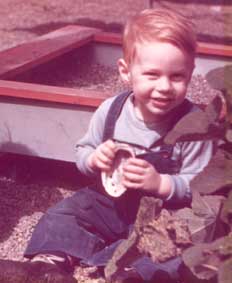 .
. 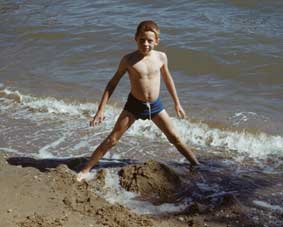 .
. 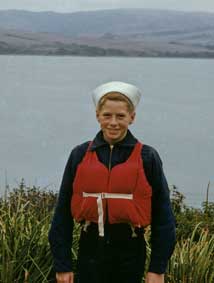
My interest in marine biology started very early (1944); building sand castles at the beach, 1951; ready for boating on Tomales Bay 1955
This page tells the story of my professional life of service to humanity as a scientist, international civil servant, and worker for ethics and responsibility in the global human system. It aims to be more interesting than a curriculum vitae or bibliography, in the hope that others may also be inspired to devote their lives to the good of humanity and the planet we all depend on. It tries to illustrate how science and religion, in my case the Bahá'í Faith, are complementary and mutually reinforcing, both in the life of an individual and more generally in society. The text of most publications is linked from their titles for those who are interested in reading them; bibliographic details are in my bibliography. For a more personal and family perspective, see the separate album of My Life and Family in Pictures.
Make me as dust in the pathway of Thy loved ones, and grant that I may offer up my soul for the earth ennobled by the footsteps of Thy chosen ones in Thy path...
Tablet of Visitation of 'Abdu'l-Bahá
I was born in Palo Alto, California, and moved down to the Monterey Peninsula at the age of 12 to live in the Del Monte Forest, so I grew up near the sea and loved the beach and seashore life. My grandmother had a summer house with beach on Tomales Bay north of San Francisco, and we also went every year to Yosemite National Park and often visited the coast redwoods, so I was surrounded by nature at its best and learned to love it and protect it.
 .
.  .
. 
My interest in marine biology started very early (1944); building sand castles at the beach, 1951; ready for boating on Tomales Bay 1955
My high school biology teacher was completing his Ph.D. at the Hopkins Marine Station of Stanford University in Pacific Grove, so we learned a lot about marine biology and I was often down in the tide pools not far from our house. My best friend Bobby Ricklefs also became a biologist and university professor.
 .
. 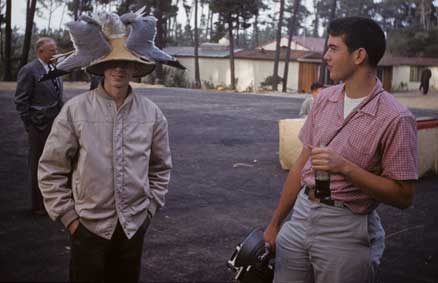
Me in the tide pools at Pebble Beach; me in a seagull hat with Bob Ricklefs
My parents were also active in the Bahá'í Faith, so my brothers and I attended Bahá'í children's classes, and many Bahá'ís of all races and cultures came to visit our home or joined in our Bahá'í activities as an example of unity in diversity. Every summer we went to the Geyserville Bahá’í Summer School north of San Francisco, where our Bahá'í friends gathered from all over the western United States. When I was 18, I was asked to teach my first adult class at the Summer School on the theme of the Learned in ‘Abdu’l-Bahá’s Secret of Divine Civilization, written in 1875 by the Son of the founder of the Bahá'í Faith. The high standard for learning that 'Abdu'l-Bahá defined in that book, to have comprehensive knowledge while avoiding desire "that has reduced to ashes uncounted lifetime harvests of the learned" and never seeking distinction, became guiding principles for my whole life of study and service, even if the goal seemed unattainable.
When I started my undergraduate studies at Stanford in 1960, I was attracted to biology, but also dabbled in archaeology and other subjects. After 6 months studying at Stanford-in-France my sophomore year, I declared my major in biology, and had a course in evolution (we did not then talk much about ecology) with Paul Ehrlich. My senior year, my departmental honors project was with Peter Raven on chromosome polyploidy in plants. Both became famous as their careers developed. I also took an experimental spring course in biological research at the Hopkins Marine Station of Stanford University in Pacific Grove, on Monterey Bay. It was a single 15 unit course, in which we had lectures by different specialists on the organisms we were to study (two species of the periwinkle Littorina), defined a research question, carried out experiments to answer it, and wrote up the results in a form ready to publish in a scientific journal, all in 10 weeks. I was interested in the snails' food preferences under different environmental conditions and locations on the shoreline. This resulted in my first research publication as an undergraduate: Macroscopic algal foods of Littorina planaxis Philippi and Littorina scutulata Gould (Gastropoda: Prosobranchiata) in 1964.
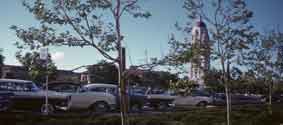
All through my professional career, described chronologically below, certain common themes stand out. Behind all of this is a systems perspective, trying to understand natural and human systems in all their complexity, and relating them to the even more profound systems view of human purpose and an ever-advancing civilization expressed in the Bahá'í Faith. Its teachings see all religions as one process of progressive revelation, its goal is to work for the unity in diversity of the whole human race, and it holds a deep appreciation for the natural world upon which we ultimately all depend. These are themselves all part of a systems view that unites human and natural perspectives. Its definition of a higher human purpose to acquire moral and ethical qualities and grow spiritually provided me with a practical way to understand its teaching of the harmony and complementarity of science and religion. Science without religion reinforces materialism, while religion without science falls into superstition. There has never been any conflict between my scientific and spiritual paths of service, which have been mutually reinforcing. My recent work on global governance is another attempt to address the institutional requirements for the management of our human and natural planetary system.
Factors controlling interactions between organisms and their environment
Ecology in the broadest sense has been a lifelong interest, marrying a love of nature and a scientific curiosity for how it all works together. My research started with my studies on the ecology of the periwinkle Littorina (Gastropoda) at Hopkins Marine Station of Stanford University as an undergraduate in 1964. During my graduate studies at the University of California at Santa Barbara, I made culture studies of subtidal marine algae (1964-1966) and studied the life history and epiphytism of the brown alga Soranthera (Phaeophyta) in 1965. My doctoral research focused on the ecology, reproduction, submicroscopic structure, and vegetative development of the brown alga Zonaria farlowii (Dictyotales) through 1969.
With my move to the Smithsonian Institution in 1969, I developed quantitative marine ecological surveys and long-term coral reef monitoring techniques. In American Samoa, I found the coral reef research site of the Carnegie Institution of Washington expedition of 1917-1920 and repeated their quantitative coral reef transect. Others have followed up, and we now have more than a hundred years of data on how the reef has changed over time. With other young researchers, Ian MacIntyre, Klaus Reutzler and Steve Smith, we organized a team of 80 of the world's leading coral reef specialists to develop an interdisciplinary programme to study the coral reef ecosystem and develop a theoretical systems model with 104 by 104 compartments (1970-1974). As part of this, I developed techniques to quantify coral reef and algal surface areas and spatial relationships, to show how much biologically-functional surface could be generated by living systems. I also undertook research on deep coral reef ecology as an aquanaut in the Puerto Rico International Undersea Laboratory (PRINUL) habitat, Puerto Rico, 1972.
Conservation of nature
My first assignment at the South Pacific Commission in 1974 was a special project on the conservation of nature, since hardly anything had been done in the biologically rich Pacific Islands. I made a survey and classification of all the marine and terrestrial ecosystems in the South Pacific region for the South Pacific Commission and the International Union for the Conservation of Nature (IUCN) (1975-1979), preparing a Regional Ecosystem Survey and organizing a series of regional meetings. This culminated in 1986 with the IUCN publication of a detailed analysis of the biodiversity, nature conservation requirements and protected area system in Oceania. I helped a number of countries to create their first protected areas, and later helped to oversee the South Pacific Biodiversity Conservation Programme (GEF/UNDP) creating locally-managed protected areas in 14 countries.
Environmental impact assessments
While pollution studies have not been my main interest, I did contribute to the study of the initial effects of the Santa Barbara oil spill in 1969. In the Pacific, I undertook research into urban impact on the coastal zone in tropical developing countries and studied appropriate strategies for waste management (1979-1982).
I made an environmental impact assessment of a hydroelectric project in a national park in New Caledonia, 1982-1983, which resulted in the cancellation of the project. I also collaborated with IFREMER, the French ocean research organization, on the analysis and quantification of storm effects on coral reefs using SPOT satellite imagery, 1987-1988, since I had done field work on the island concerned.
Island ecology
With all my experience on islands, first in the Caribbean, Pacific and Indian Ocean with the Smithsonian, and then living 11 years in New Caledonia as an environmental advisor to all the Pacific Island countries and territories, I wanted to help islanders to take responsibility for their own environmental protection and management combining their own local and traditional knowledge with science. I prepared studies and training materials on techniques for rural environmental resource management in tropical islands, including traditional approaches to environmental management, 1982-1989. I took this interest to the global level, leading an islands task force at IUCN and preparing a global analysis and classification of islands according to ecological, geographic and socio-economic criteria, with indicators of both conservation interest and human threats to suggest priorities for action. From a systems perspective, I was interested in the effects of limits on complex systems, asking how both human and biological systems scale down on small islands. This included the preparation and maintenance of a database on islands, 1985-1995, archived at http://yabaha.net/dahl/isldb/isldir.htm. I also published the IUCN/UNEP Directory of Islands with details on 2,000 of the most important islands.
Indicators of sustainable development
Indicators are one way of making sense of a dynamic complex system. I had already developed indicators of the surface area of coral reefs, and used a wide range of indicators to evaluate islands, so it was logical to extend this interest to ways to measure and indicate sustainable development. Agenda 21 adopted at the Earth Summit in 1992 ended with Chapter 40: Information for Decision-making, including a request to develop indicators of sustainable development in both its environmental and economic dimensions, making specific mention to Earthwatch. In my responsibility as Coordinator of the UN System-wide Earthwatch from 1992, it fell to me to lead this process across the whole UN system and with the scientific community. I therefore organized a working group to design and lead the Commission on Sustainable Development programme of work on indicators of sustainable development for use by governments, 1994-2001. At the same time I was part of two SCOPE (Scientific Committee on Problems of the Environment) projects on indicators of sustainability, 1994-1997 and 2003-2006 to address the challenges from a scientific perspective. With a number of other experts including Donella Meadows (Limits to Growth), Joachim Jensinghouse (EU), Peter Bartelmus (UNSTAT), Peter Hardi and Laszlo Pinter (IDRC) and others, we formed a Consultative Group on Sustainable Development Indicators, 1996-2005, including development of the Bellagio Principles and the Dashboard of Sustainability. I returned to the question of indicators for small islands as a collaborator in the SOPAC project on the Environmental Vulnerability Index, 1999-2005. After retirement, I became an expert adviser for the World Economic Forum to Yale University and CIESIN on the redesign of the Environmental Sustainability Index 2005, and the development of the Environmental Performance Index 2005-2006. I was a consultant in the preparation of the Humanitarian Response Index 2007. Some of our most groundbreaking work was on finding indicators for intangible things like human values, as a partner in a European Union-funded project on The Development of Indicators and Assessment Tools for Civil Society Organization Projects Promoting Values-based Education for Sustainable Development, 2008-2011: http://blogs.brighton.ac.uk/esdinds/ and http://www.wevalue.org/. This led to chairing a workgroup of the Partnership for Education and Research about Responsible Living (PERL) to prepare toolkits for secondary school teachers on values-based learning and indicators, 2012-2015. Meanwhile I had a series of assignment with the World Bank Group, first as consultant to develop the concept of a new development index based on development at the individual level (2012-2015), then on a Business Environment for Energy Index (2013), and to plan an inventory of national discriminatory and anti-discriminatory legislation and indicators (2014). With the adoption of the Sustainable Development Goals in 2015, I was a consultant to both the World Bank Group and UNEP on the Sustainable Development Goals and indicators, 2014-2016. Then I became an international partner in the Make Visible research and action network, Wageningen University for IPBES, to find indicators for indigenous and local knowledge for SDG14 and SDG15, and on the Advisory Group for the Transforming Education for Sustainable Futures project at the University of Bristol, 2020-2023, with activities in India, Rwanda, Somalia/Somaliland, and South Africa. Most recently, we have been working on alternative non-financial indicators of human and environmental well-being through Global Solidarity Accounting.
Global governance
Since the Bahá'í writings call for uniting all humankind in a world federation of nations, this has always been part of my vision of the future society that we all should help to construct. Apart from supporting the United Nations and participating in world federalist activities in high school, my first introduction to improving global governance was participating in the United Nations Conference on the Human Environment in Stockholm in 1972, which founded the United Nations Environment Programme (UNEP). Two years later, when I joined a regional intergovernmental organization, the South Pacific Commission, my career to build collaboration between governments on shared environmental problems was well under way, working closely with UNEP and other parts of the global system. The next logical step was becoming a UNEP staff member assisting governments to organize into Regional Seas Programmes to work together on their shared marine resources. As part of the secretariat for the UN Conference on Environment and Development, the Earth Summit in Rio de Janeiro in 1992, my challenge was to draft part of Agenda 21, capturing the need for global environmental governance in text that all countries could agree to. My next assignment as Coordinator of the UN System-wide Earthwatch involved helping all parts of the UN system, international conventions and the scientific community to monitor the global environment and to warn governments of new problems that were emerging requiring global action, at the interface of science and policy. Most recently, with global economist Augusto Lopez-Claros and international jurist Maja Groff, we have developed detailed proposals to reform the United Nations and bring global governance into the 21st century. I am an adviser to the Global Governance Forum and on the steering committee for the Climate Governance Commission. I was recently asked to tell the story of how the Bahá'í principles of governance led me to my professional work on governance in my paper on Governance from a Bahá'í Perspective.
The following sections describe the development of my professional activities, from my graduate studies through "retirement", with a narrative integrating my activities, publications, lectures and (more recently) my online presence. For a story that combines my professional work on governance and my life and service as a Bahá'í, see my paper on Governance from a Bahá'í Perspective.
Overview
After taking a summer course on marine algae at the Hopkins Marine Station of Stanford University in 1964, I moved to Goleta near Santa Barbara, California, to enter a doctoral program in biology, especially marine biology and ecology, at the University of California at Santa Barbara (UCSB), studying with Professor Michael Neushul Jr,, a young but promising researcher on marine algae. We learned scuba diving and took field trips along the California coast and to Baha California in Mexico.
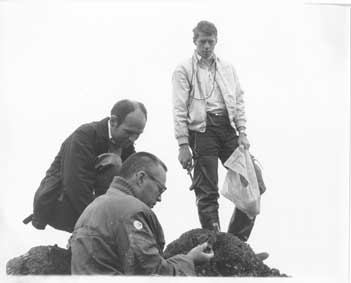 .
. 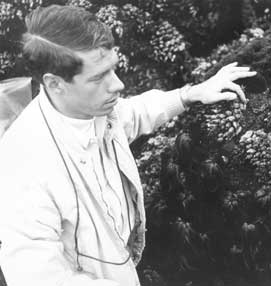
With Prof. Michael Neushul and fellow graduate student Larry Liddle collecting algae at Carmel Point in 1967.
I decided to study one of the seaweeds on the local shore, the brown alga Zonaria Farlowii, studying everything from its ecology in the field to the ultrastructure of its cells using an electron microscope. I also spent the summer of 1965 at the Friday Harbor Laboratories of the University of Washington on San Juan Island. In 1966, I participated in the Pacific Science Congress in Tokyo, Japan, presenting a paper on behalf of my professor, and then visited Bahá’í communities and seaweed farming areas in Japan, including Hokkaido, Taiwan and Korea, before flying across the pole to present a paper at the first European Symposium on Marine Biology on the island of Helgoland, Germany, and on for a seminar at the University of Paris. Shortly before I completed my doctorate, the Santa Barbara oil spill of 1969 spread oil across my research material, and I was doing pollution studies by default, an early baptism on environmental problems.
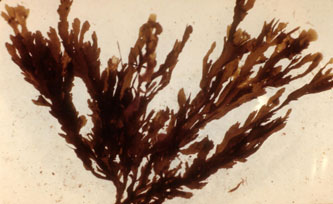 .
. 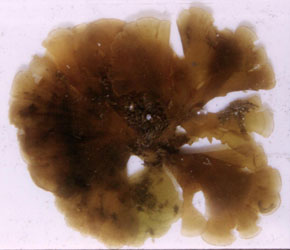 .
. 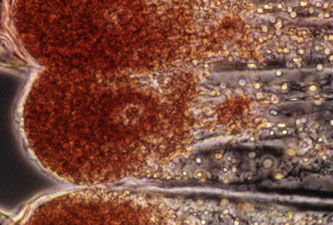
The brown alga Zonaria, intertidal and subtidal forms; apical cells
Chronology
My international career as a specialist on marine algae began in 1965 as a participant in the Fifth International Seaweed Symposium, Halifax, Canada. I also co-authored a paper presented at American Association for the Advancement of Science Meeting, Berkeley, California. In the summer at the Friday Harbor Laboratories of the University of Washington, I studied the life history and ecology of the brown alga Soranthera.
In 1966, I made a long trip to the Far East, presenting a paper on behalf of M. Neushul at the Pacific Science Congress, Tokyo, Japan, participating in a Symposium on Marine Parks following the Congress, and visiting Japanese algological laboratories and seaweed farming areas. I then visited Bahá'í communities in Japan, Taiwan and Korea, before flying over the pole to Germany to present a joint paper with M. Neushul at the First European Symposium on Marine Biology on the island of Helgoland: Composition and growth of subtidal parvosilvosa from Californian kelp forests (1967). I also gave seminar at the Laboratoire de Biologie Végétale Marine, Université de Paris, France. Later in the year I co-authored a paper presented at the Western Society of Naturalists meeting, California, on Growth and development of Sciadophycus stellatus Dawson (1967).
In 1968 I presented paper based on my doctoral research at the Sixth International Seaweed Symposium, Santiago de Compostela, Spain: The effect of environment on growth and development in Zonaria farlowii, as well as at the Western Society of Naturalists meeting in Oregon.
In the last year of my doctoral programme in 1969, I made field collections of marine algae in the Gulf of California, Mexico, and the Caribbean (Puerto Rico and Windward Islands) and participated in the initial field surveys of the effects of the Santa Barbara oil spill in front of our university in California, which came in over my research material.
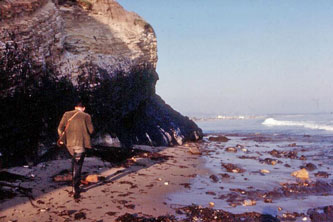 .
. 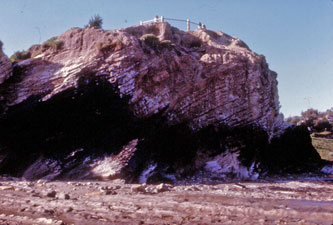 .
. 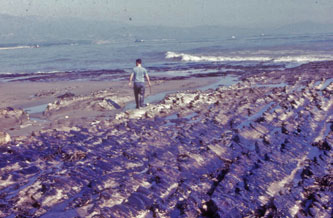
Santa Barbara oil spill 1969, Prof. Michael Neushul; Richard Zingmark on the polluted shore
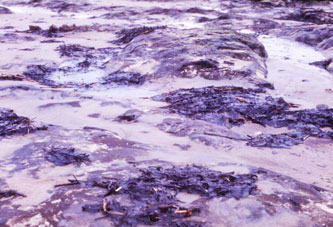 .
. 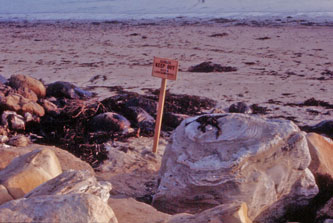 .
. 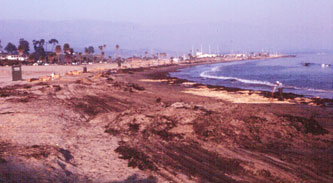
Tarred seagrass and algae; beach cleanup by sand removal
I also presented a demonstration at the Eleventh International Botanical Congress, Seattle, Washington, including a large electron microscopic model of The meristematic cell as a developmental unit in the brown alga Zonaria,. My first publication combining my science and my Bahá'í perspective was The ocean - our last resource published in World Order, Winter 1969. Then I moved from California to Washington, D.C.
Most of my dissertation was published as Development, form and environment in the brown alga Zonaria farlowii (Dictyotales) (1971), in which I integrated a systems perspective on how the form of the plant was determined in different environmental conditions. Basically, all the growing cells at the edge of the plant needed to know was whether they should divide horizontally or vertically depending on their width and length. All the rest of the distinctive clumped forms in the intertidal and broad sheets in the subtidal were determined by external environmental factors. A simple system could lead to considerable complexity. My professor continued our work on the ultrastructure of the seaweed I studied, producing two more research papers wth me: Zonation in the apical cell of Zonaria and Ultrastructural studies of brown algal nuclei (1972).
Overview
After completing my studies in 1969, I was offered a one year position as Visiting Postdoctoral Research Associate in the Department of Botany at the National Museum of Natural History, Smithsonian Institution in Washington, D.C., to undertake research on marine algae, and I decided to focus my research on coral reef ecosystems as one of the most complex natural systems. I was looking for a more permanent position, hopefully in a developing country. The Governor of American Samoa came to the Smithsonian asking for help to identify their environmental problems, and since I could as easily study coral reefs there as at the Smithsonian field stations in Panama, I went to Samoa to establish long-term monitoring transects to observe the dynamics of the coral reefs, and prepared a report for the Governor on Samoa's environmental problems. I learned about the South Pacific Commission (SPC, now the Secretariat of the Pacific Community), a regional intergovernmental organization, and applied there for a job after my fellowship. However the SPC did not have the funds, and the Smithsonian offered me a permanent civil service position as Associate Curator in the Department of Botany, National Museum of Natural History, to continue my research. For the next four years, I went on diving expeditions to reefs around the world, lived for two weeks in an undersea habitat as an aquanaut studying the reefs of Puerto Rico, collaborated with other young researchers to develop a global program with 80 researchers to develop a computer model of the coral reef ecosystem, and helped to establish a Smithsonian field station on Carrie Bow Cay on the Belize barrier reef.
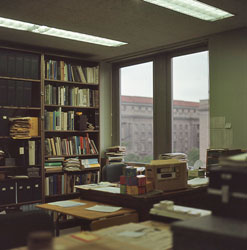 .
. 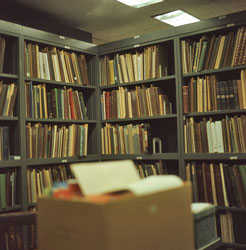 .
. 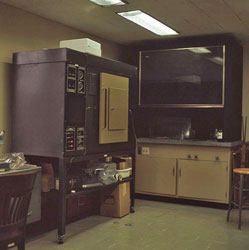 .
. 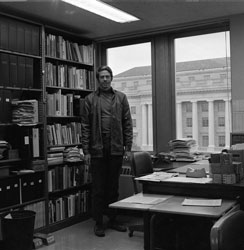
My Smithsonian office and laboratory 1971
 .
. 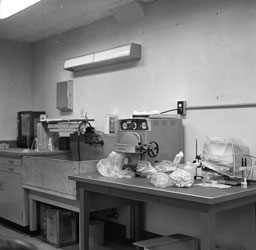 .
. 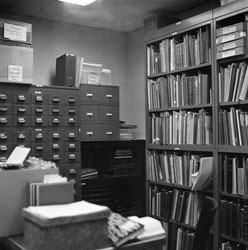 .
. 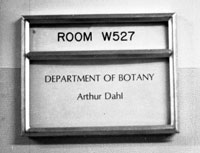
My Smithsonian office 1971
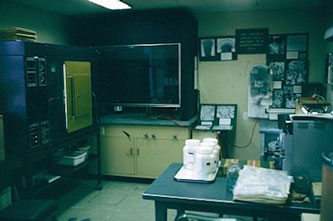 .
. 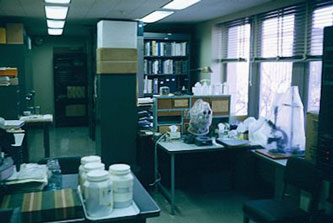
My Smithsonian laboratory 1970
Chronology
During my post-doctoral year at the Smithsonian Institution in 1970, I visited Western and American Samoa to establish coastal monitoring surveys and to conduct ecological research, and prepared an ecological report on American Samoa at request of the governor: Ecological report on Tutuila, American Samoa. I also made diving surveys of coral reefs and algal collections at Eilat, Israel. The first results of my field work in Samoa resulted in a presented paper at the Seventh International Seaweed Symposium, Japan: Ecology and community structure of some tropical reef algae in Samoa (1972). I also presented my doctoral research at the International Botanical Congress.
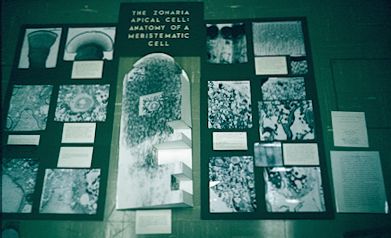
Presentation of my doctoral research at International Botanical Congress 1970
Following my permanent appointment to the National Museum of Natural History in 1971, I joined with other young researchers including Ian MacIntyre, Klaus Reutzler and Steve Smith, to plan a Comparative Investigations of Tropical Reef Ecosystems programme to understand how coral reefs worked in different parts of the world. We assembled a team of 80 of the world's leading coral reef experts in each domain from physical oceanography through invertebrates and fish to terrestrial influences and computer modelling to develop an interdisciplinary study of the world's most complex ecosystem. We prepared a theoretical systems model with 104 by 104 compartments. With some colleagues, I participated in diving reef surveys at Acklins Island, Bahamas; the Caribbean and Pacific coasts of Panama; Belize, particularly Glovers Reef; Palau, Yap, Ant and Pakin (near Ponape) in Micronesia; and American Samoa, looking for the best places for our field research.
I was then the co-organizer and a working group leader at our Coral Reef Workshop on Glovers Reef off the coast of Belize with 40 researchers for two weeks to plan the research programme for the next ten years in some detail. Unfortunately, while the National Science Foundation had funded our project preparation, they had to choose between biology and running oceanographic ships, and chose the latter. We published the conceptual work and the descriptions of the possible field sites, but could not continue with the ambitious plan to collect the data and run the computer models, which were in any case pushing the capacity of computer systems modelling as it was in 1972. These publications in Atoll Research Bulletin No. 172 were: Sachet, Marie-Hélène and Arthur L. Dahl (eds), Comparative Investigations of Tropical Reef Ecosystems: Background for an integrated coral reef program, Dahl, Arthur L., Bernie C. Patton, Stephen V. Smith and Jay C. Zieman, Jr. (eds.) A preliminary coral reef ecosystem model, and Dahl, Arthur L., Ian G. Macintyre and Arnfried Antonius, A comparative survey of coral reef research sites (1974).
In 1972, I continued my research on coral reef algae at the Smithsonian Tropical Research Institute in Panama and in Belize. We set up a permanent field station on Carrie Bow Cay right on the Belize Barrier Reef. Since I wanted to return something to the country that hosted my research, the local Belize Bahá'ís helped me to organize a lecture tour on coral reef ecology for all the secondary schools in the country. I even made a presentation to the local fishermen, who had fished all their lives on the reef but had never seen what it was like underwater or knew how the ecosystem worked.
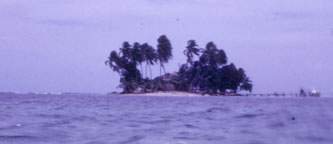 .
. 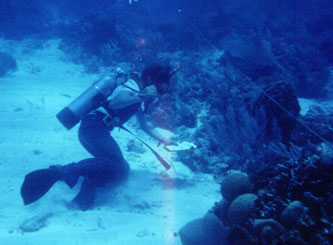
Carrie Bow Cay Smithsonian field station; diving on Belize Barrier Reef
In June 1972, the Bahá’í International Community (BIC) asked me to represent them as an accredited observer at the United Nations Conference on the Human Environment in Stockholm, Sweden, which created the United Nations Environment Programme (UNEP). I addressed one of the sessions about the need to collaborate with non-governmental organizations. We prepared and distributed a statement on The Environment and Human Values, and organized a booth in the non-governmental forum. On the scientific side, I also visited laboratories and museums in Norway, Sweden and Finland.
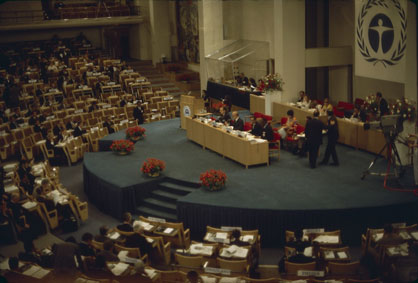 .
. 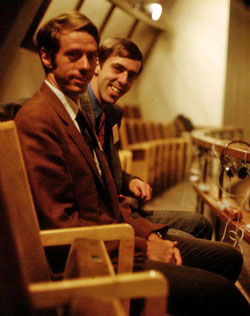
UN Conference, Stockholm 1972 [Download high resolution photo by A. Dahl 1.5 mb]; Bahá'í delegation to the Stockholm Conference
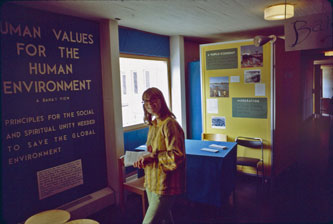 .
. 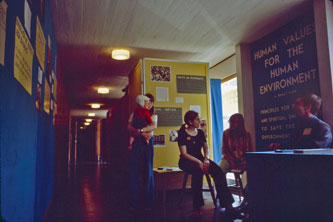
Bahá'í booth at the non-governmental forum
My interest in a broader systems perspective on our human and natural planetary system, or what would now be called sustainability but was then ecodevelopment, drew me to the 1972 report to the Club of Rome on The Limits to Growth, and my publication of a book review: Ecological consequences of immoderation (1972).
Another interesting opportunity in December 1972 was to be an Aquanaut studying reef algal ecology in two-week saturation diving mission of the Puerto Rico Inter-National Undersea Laboratory (PRINUL), 20 meters down on the bottom of a coral reef (see separate page). The result was a publication on Benthic algal ecology in a deep reef and sand habitat off Puerto Rico (1973) which showed that a seaweed and a colonial animal could not live independently on the shifting sandy bottom, but with the alga more deeply rooted and the animal making a carpet over the sand to keep it from washing away, together they could populate the sand successfully.
 .
. 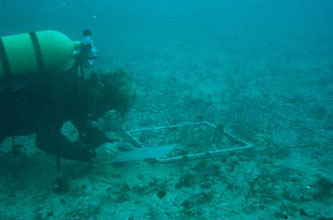 .
. 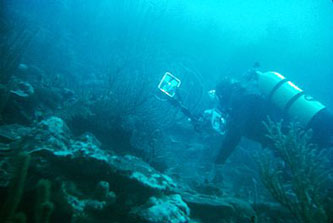
Aquanaut in an undersea habitat
My work on marine algae continued in 1973, in particular my research on coral reef algae and reef ecology in Belize. One result was a significant paper showing how the coral reef community created a large functional surface area many times the horizontal surface to absorb more light and catch more food: Surface area in ecological analysis: quantification of benthic coral reef algae (1973). This was my first experience in developing a quantitative indicator for a complex phenomenon, and the paper is still frequently cited today. Other scientific activity was a note on Biological proportions in Science (1973), a book review The biology of the Rhodophyta (1974), and a presented paper at a Northeast Algal Discussion Group Meeting in Connecticut.
I also presented a paper at the Second International Symposium on Coral Reefs, held on the cruise ship M.S. Marco Polo sailing up and down along the Great Barrier Reef of Australia, with frequent opportunities to dive on the coral reefs and to discuss them with 300 of the world's leading specialists. We had a post-symposium field trip to visit reef habitats in Fiji, staying in a local village on an outer island. My paper was published as The structure and dynamics of benthic algae in the coral reef ecosystem (1974).
I continued my reef monitoring and environmental surveys in American and Western Samoa, and prepared revised ecological report for Government of American Samoa: Ecological report on American Samoa (1973).
In early 1974, I participated in a Harbor Branch Foundation Coral Reef Workshop in Fort Pierce, Florida. The foundation had a revolutionary research submarine, the Johnson-Sea-Link with a clear plastic sphere and a diving compartment, and I was invited to become its research director, but fortunately I declined, as shortly after it became trapped in a wreck and part of the crew died. My field research continued on coral reef algae, reef surface area, and competition for space in Belize. I presented an invited paper at the International Symposium on Indo-Pacific Tropical Reef Biology in Guam and Palau on Generation of photosynthetic surface area by coral reef algae, and examined reef sites in Guam, Palau and Hawaii. I also presented a paper at the Eighth International Seaweed Symposium in Wales on Algal zonation on the Belize barrier reef (1981).
Overview
In 1974, 5 years after my application, the South Pacific Commission (SPC, now the Secretariat of the Pacific Community) finally offered me the post of Regional Ecological Adviser to all 22 Pacific Island countries and territories, based at their headquarters in Noumea, New Caledonia. I resigned from the Smithsonian and achieved my dream to use my science to be of service to the poorest developing countries, moving from Washington, D.C. to Noumea. That first year, I visited almost all the Pacific Island countries to determine their needs, and went around the world establishing relations with organizations like UNEP in Nairobi, the International Union for the Conservation of Nature (IUCN) in Switzerland, and various organizations in the United States.
For the next eight years, I assisted the island countries with everything from primary school curricula to creating national parks and reserves, training environmental planners, surveying all the ecosystems of the region, organizing scientific meetings, adopting a Convention on Conservation of Nature, and finally planning and launching the South Pacific Regional Environment Programme (SPREP), adopted by UNEP as a Regional Seas Programme, that eventually separated from SPC to become its own intergovernmental organization based in Apia, Samoa. I then had to leave SPC in late 1982, which had adopted a limit on professional service. However I remained for two years in Noumea developing training materials for SPREP on rural environmental management, and then continued as a consultant to SPC and other organizations and governments, moving to France in 1985.
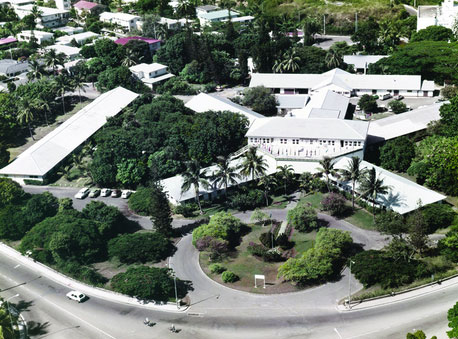 .
. 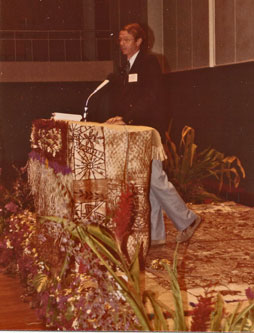
South Pacific Commission headquarters, Noumea, 1980; Speaking at a public meeting in Apia, Samoa, in 1984
Chronology
After moving from Washington, D.C. to Noumea, New Caledonia in 1974, I visited international organizations concerned with environment in Kenya, Switzerland, France, United Kingdom, and U.S.A. (New York, Washington, California and Hawaii) on behalf of the South Pacific Commission. To design my work programme to respond to the real needs of the island countries and territories, is was necessary to discuss environment and conservation activities with the governments in American Samoa, Cook Islands, Fiji, French Polynesia, New Caledonia, New Hebrides, Niue, Tonga, Trust Territory of the Pacific Islands, and Western Samoa. The complexity of this was illustrated by my meetings in the New Hebrides, still an Anglo-French Condominium before independence as Vanuatu in 1980, when the British Resident Commissioner encouraged my work, while the French Resident Commissioner resisted, saying this would interfere with the colonists ability to make money, and in any case the natives were not capable of learning about such things. My more practical work began immediately, drafting environmental legislation for Niue, attending a Pacific Islands Tourism Conference in Samoa, and another meeting on Resource Utilization in the South Pacific in New Caledonia.
To build regional momentum for environmental action in 1975, I edited the first issues of a bilingual SPC Environment Newsletter with articles on the South Pacific Commission environment programme, Environmental impact analysis in the Pacific Islands, and Coral reef surveys.
The Solomon Islands Government invited me to prepare report on environmental management and conservation, and draft legislation. Their Queen Elizabeth National Park, created in colonial times behind Honiara, had been neglected and abandoned, so I recommended improvements in my Report on conservation and environmental management to the Government of the Solomon Islands.
In addition, they asked me to investigate a fisheries management problem in the Lau Lagoon on the island of Malaita. The fishermen lived in villages on artificial islands in the lagoon, where the local traditional money consisting of strings of white, black and orange disks cut and ground circular from different shells. Only one kind of shell had a band of orange, and these were most highly prized, and subject to overfishing. They were becoming hard to find.
Strings of the money were used for traditional exchanges such as to buy pigs or wives. The same custom group included Bougainville island in Papua New Guinea, which had at the time the world's largest copper and gold mine. The mine workers with good salaries could buy more strings of money for traditional exchanges, a kind of traditional inflation, producing a shortage. The Lau Lagoon could not keep up with the demand.
When I went to the district centre on Malaita to organize transport to the Lau Lagoon, this was refused because the islanders had had problems with the government over fishing techniques, and no one from the government was welcome. Someone mentioned that I was a Baha'i, and Baha'is were always welcomed there, so I went out to the village of Ridvan on the edge of the Lau Lagoon, where most of the population was Baha'i. The Baha'is explained that the shell fishery was traditionally managed by an old pagan priest, and he was still alive, living in the taboo sacred area on an artificial island. With their help, I was able to visit the old priest in his taboo house.
The priest explained that he controlled the shell fishery by placing taboos on different parts of the lagoon, banning collecting. When he received enough pigs to sacrifice, he would perform the traditional ceremonies and then lift the taboo on one section of the lagoon so that the shells could be collected to make the shell money. Then he would put the taboo on again until enough pigs were given for the ceremony, when he would lift the taboo on another section of the lagoon. Normally, he would keep the taboo on any area for 4-5 years, just the time for the shells to reach the right size to harvest, an excellent fisheries management technique. However, since World War II, most of the villagers had become Christian or Baha'i and were no longer giving pigs to sacrifice, so he had kept the taboo on for 30 years. The system had broken down and the taboo was no longer respected.
I met with the fishermen and explained the wisdom behind the traditional taboo system. If they no longer followed the old pagan religion, they could at least designated some wise old fishermen that they all respected, and ask them to close and open parts of the lagoon to shell collecting in the same way, to maintain the productivity of the resource. There was also an economic wisdom to the old system, as it maintained the value of the shell money in terms of the number of pigs sacrificed, as pigs were very valuable (the pig standard).
The taboo houses were in a separate walled area of the island, and mostly in disrepair. There were also some piles of skulls. In the house I visited, there were shelves along the back wall with baskets, each containing a skull. The priest explained that these were his ancestors in the priestly line, and he needed to recite their names during the ceremony. They were there to remind him. There were holes in the thatched roof, and I asked why he did not repair it. He said that was difficult. In order to rebuild a taboo house, you had to dig a large hole, place a man in the bottom of the hole, and place the center post (a tree trunk) on top of the man. Since WWII, it was no longer possible to find a man to put in the hole. Obviously it was not desirable to retain all parts of the traditional religion, so local people must decide what to reject and what to retain. This was a valuable introduction to the importance of indigenous knowledge and traditions in their own cultural framework, and the need to integrate them with modern science.
 .
. 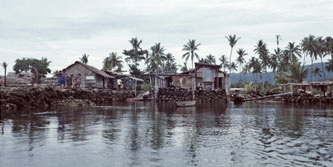 .
. 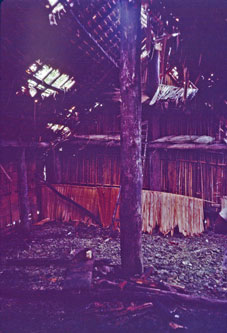
Me diving on coral reefs; Coastal village, Lau Lagoon, Malaita, Solomon Is; Taboo house, Lau Lagoon, Malaita, 1975
The Governments of New Zealand and Australia wanted to encourage conservation action in the region in support of my programme, so they organized the first in a series of South Pacific Conferences on National Parks and Reserves in the Parliament Building in Wellington, and invited ministers from across the region, while announcing the creation of new protected areas in their own countries. I was a keynote speaker on The challenge of preserving the South Pacific environment. I also presented two papers (one invited) at the Thirteenth Pacific Science Congress, Vancouver, Canada, and another at a Symposium on Ecology and Conservation in Papua New Guinea on Ecology and conservation: the regional dimension.
I also visited the Cook Islands, French Polynesia, Papua New Guinea, Solomon Islands, Guam, Palau, Yap, Saipan, Truk, Ponape, and Majuro to collect information for a regional ecosystems survey to show the countries what natural features and species they had of conservation importance, with support from the International Union for Conservation of Nature (IUCN). One result was an Ecological Report on French Polynesia, submitted to the Government of French Polynesia. Another project was to construct environmental exhibits and train staff for the new Museum of American Samoa while continuing my reef monitoring surveys there.
My work on the regional ecosystems survey continued in 1976 with visits to Fiji, Gilbert Islands, Nauru, New Caledonia and the New Hebrides. While I was coming on official business with the government, it was often through the local Bahá'ís that I could come to know the country, its people and culture better. For example, in the Gilbert Islands (now Kiribati), the tradition was for an important visitor to go to the first village on the island, meet with the chiefs and explain the purpose of the visit. The government ignored this, so the Bahá'ís took me to that village the first evening, I explained what I had come to do, and was welcomed in traditional fashion. When I went into the field to collect information, word had gone ahead that I had respected custom, and the cooperation I received was much better than if I had just been another visiting expert.
The result of my survey of island ecosystems was presented as a working paper Regional Ecosystems Survey of the South Pacific Area at the Second Regional Symposium on Conservation of Nature which I organized and directed in Apia, Western Samoa on 14-17 June 1976. It was revised and published in 1980. I also made a Report on the Special Project on the Conservation of Nature of the South Pacific Commission. This was followed by a Plenipotentiary Meeting to conclude a Convention on Conservation of Nature in the South Pacific (the Apia Convention), where I was part of the secretariat. One event at the meeting illustrated the importance of understanding differences in value systems. The Minister from Papua New Guinea said how glad he was to be in Samoa because of the close tie between the people of Samoa and the people of Papua New Guinea. When Christianity first came to the region, Samoans were taught as catechists to bring the Good Word to other countries including Papua New Guinea, and they had eaten them. Of course, in his traditional culture, when you defeated a brave warrior in battle, you ate him to acquire his good qualities, so this was a sign of respect.
Later that year I conducted a survey of reef and lagoon areas for the Government of the Cook Islands, producing a Report on marine surveys of Rarotonga and Aitutaki (1980).
My scientific reef work continued in 1977, participating in the Third International Coral Reef Symposium in Miami, Florida, with a paper on Monitoring man's impact on Pacific Island reefs. Another paper with Austin Lamberts described what we had learned from our reef monitoring in American Samoa and the major changes in coral cover in response to environmental impacts: Environmental impact on a Samoan coral reef: a resurvey of Mayor's 1917 transect. I also reviewed a book on soil erosion and its implications for food supplies in Losing ground. One result of my work in the region was increasing interest in a regional approach to environmental issues. Small island states individually lack many resources and capacities for complex environmental conservation and management, so it makes sense to collaborate and share knowledge and expertise. UNEP was also encouraging regional approaches through the Regional Seas Programme and provided support. I organized and directed an inter-governmental expert planning meeting in New Caledonia for a South Pacific environmental management programme to start the process. I was also a resource person for an Asian Development Institute Workshop in Western Samoa on Development Planning with Special Reference to Evaluation, presenting on Environmental aspects of project planning in the Pacific region. Later that year I visited Tonga at Government request and prepared an Environmental and ecological report on Tonga focusing on Tongatapu, and including draft legislation (1978).
There was a great need to train people from the islands, so in early 1978 I directed a seven-week Sub-regional Workshop in Environmental Planning and Assessment in Papua New Guinea, with participants from various Pacific countries. We studied marine issues at Motupore Island of UNPG, technology at the University of Technology at Lae, mountain problems at the Wau Ecology Institute, and mining impact at the Bougainville Copper Mine, contrasting the company's positive view of their environmental and social responsibility with the contrary perspectives of the local government and people (which soon led to a revolution). I also attended the South Pacific Regional Meeting for the United Nations Conference on Science and Technology for Development in Fiji, directed the Second Technical Meeting on the South Pacific Regional Environment Programme in Noumea, presented a paper on Marine ecosystems and biotic provinces in the South Pacific area at the International Symposium on Marine Biogeography and Evolution in the Southern Hemisphere in New Zealand and Fiji, and published a scientific paper on Spatial modelling of coral reefs (1978). To make scientific methods more accessible to reef users for participatory science, I organized and directed an Expert Meeting on Coral Reef Monitoring, Motupore Island, Papua New Guinea, which let to a simple Coral reef monitoring handbook (1981) which was reprinted by UNEP in their Reference Methods for Marine Pollution Studies No. 25 in 1984. I also visited Western Samoa to prepare a Report on assistance to Western Samoa with national parks and conservation (1978), and planned an underwater nature trail in the Palolo Deep Marine Reserve that I had designed earlier.
Following on from the Wellington Parks and Reserves Conference in 1975, the Australian Government hosted the Second South Pacific Conference on National Parks and Reserves in 1979 in the Sydney Opera House, where I chaired a panel. This helped to build further momentum for nature conservation in the region. I was a consultant to a UNESCO meeting on development of coral reef research and marine science activities in the Pacific, Honolulu, Hawaii, continued my assistance to Western Samoa in developing national parks and reserves and drafting an environmental policy, attended meetings of the IUCN Commission on Ecology and Commission on National Parks and Protected Areas in Canberra, Australia, presented paper on Port pollution at the Sixth South Pacific Ports Conference, Rarotonga, Cook Islands, and presented a paper on Environmental aspects of industrial fisheries development in American Samoa: a case study in training needs at a Workshop on Natural Systems Management Training at the East-West Center, Honolulu, Hawaii. Finally, I was a participant in a Joint SPC/NMFS Workshop on Marine Turtles in the Tropical Pacific Islands, Noumea, New Caledonia, and directed a Territorial Workshop in Environmental Planning and Assessment for rural medical officers in New Caledonia. On a visit to the New Hebrides, then preparing for independence as Vanuatu, I saw the challenges of moving from a condominium of two parallel governments to a single nation. The Attorney-General explained that the French Code Napoleon and British common law were so incompatible that he had to draft a new set of national laws from scratch; only the mining law was technical and could be retained. The Director of Public Works said that, since all land outside urban areas would revert to traditional customary ownership on independence, he had to renegotiate the rights-of-way for all the roads in the country. They really decided to start over beyond their complex colonial heritage.
My Regional ecosystems survey of the South Pacific area was published as a SPC Technical Paper in 1980, and another paper with Dieter Mueller-Dombois on Monitoring island ecosystems: an approach for conservation purposes was presented at the Fourteenth Pacific Science Congress in Khabarovsk, USSR. To reach a wider audience, I wrote and directed Story of an island: managing your island environment, a 45 minute educational film that showed a typical island going from pristine purity to limited impacts by the first inhabitants to the modern situation with a town, roads, plantations, forestry and fishing. It then showed two alternative futures, one with continuing development without concern for the environment, leading to pollution and destruction, the other balancing development and environmental management for a sustainable future. The film was given to all the island countries. In Vanuatu it was shown in the Council of Ministers, creating high level interest in environmental protection. The Government of New Caledonia asked me to direct a major study of pollution problems and waste treatment strategies for the Noumea urban area. I continued my long-term monitoring surveys of coral reefs in American Samoa, and assisted with museum exhibits development, conducted a Workshop on Environmental Planning and Assessment for the Government of Niue, drafted a country report on Vanuatu for the South Pacific Regional Environment Programme, presented a paper on Conservation planning and environmental monitoring for tourism development at a UNESCO Tourism Workshop in the Cook Islands, presented a paper at the Second International Symposium on Biology and Management of Mangroves and Tropical Shallow Water Communities, and was an invited participant in a UNESCO Seminar on Marine and Coastal Processes in the Pacific, both in Papua New Guinea. In mid-1980, my work was cut short by a drunk driver who nearly killed me, and I was unable to work for nine months, setting the preparations for the regional environment programme back a year.
When I went back to work in 1981, I organized and directed a South Pacific Regional Environment Programme (SPREP) Technical Meeting in New Caledonia to work on the details for the programme. On the coral reef side, I was an invited participant in a UNESCO Workshop in the Philippines on Research and Training Priorities for Coral Reef Management in Oceania, South Asia and Southeast Asia, and a participant in the 4th International Coral Reef Symposium in Manila, as well as publishing a scientific paper on Monitoring coral reefs for urban impact. I presented on Resources management at a UNDP-CCOP/SOPAC Inshore and Nearshore Resources Training Workshop in Suva, Fiji, visited Tuvalu to prepare its country report for the South Pacific Regional Environment Programme, was a participant in a UNEP Inter-agency Meeting on Regional Seas in Geneva, and in the IUCN General Assembly, and related meetings of its Commission on Ecology and Commission on National Parks and Protected Areas in New Zealand.
1982 started with a visit to Western Samoa to advise on the Further development of national parks and reserves in Western Samoa. The main event of the year and the culmination of my work for the South Pacific Commission was organizing and directing the ministerial-level Conference on the Human Environment in the South Pacific, 8-11 March 1982 in Rarotonga, Cook Islands, as the political launch of the South Pacific Regional Environment Programme. A main document was the report I prepared with Ian Baumgart, The state of the environment in the South Pacific in the Report of the Conference on the Human Environment in the South Pacific published by UNEP (1983). From 1975 to 1982 I edited four numbers of the South Pacific Commission Environment Newsletter, No. 1 - March 1975, No. 2 - December 1975, No. 3 - February 1980, and No. 4 - March 1982.
I also gave a paper on Practical management of limited resources at the Unique Island Status: Pacific Basin Coastal Zone Management Conference, Pago Pago, American Samoa, reviewed the environmental impact of development projects for the Cook Islands Government, presented an invited paper on Future directions for the Oceanian Realm at the World National Parks Congress in Bali, Indonesia, in October 1982, was an invited speaker at a Seminar on Conservation and Development, and a Training Course on Environmental Studies and Conservation in Fiji. Finally I produced a second SPC educational film, Your changing island environment for school use). Since there was a limit on professional service at SPC, my contract ended in November 1982.
My life as an independent consultant began in 1983 with a contract to prepare educational materials on rural environmental management for SPREP, something I had not had time to do when working for SPC. These were released by SPREP two years later as Training materials for rural environmental management (48 units and supporting audio-visual materials for Pacific Islands):
A. Explanation of the training programme
B. Sensitization to environmental problems
C. Basic resources
D. Principles of ecology and resource management
E. Traditional environmental management
F. The human habitat
G. Managing the local environment
H. Techniques for research and monitoring
I. Assessment of development projects
J. Communicating knowledge to others
K. Use and evaluation of the training materials
[I prepared an updated version for all rural areas in 2008.]
Another major activity was the preparation for the government of New Caledonia of an environmental impact study of a river diversion project in a national park: Etude preliminaire de l'impact du projet Ouinné-Pourina sur l'environnement et en particulier sur le Parc Territorial de la Rivière Bleue, which resulted in the abandonment of the project. I was also an adviser on museum development in New Caledonia, and an invited lecturer at the IOI/FFA/USP Exclusive Economic Zone Management Course in Fiji. At the Fifteenth Pacific Science Congress in New Zealand, I was a session organizer, session chairman and invited speaker.
In 1984, to make the issues in the Pacific known to a wider audience, I published papers on Oceania's most pressing environmental concerns and Biogeographical aspects of isolation in the Pacific in the international journal Ambio, and held consultations with international organizations in Paris and Geneva on environmental actions in the Pacific. I also visited Fiji for discussions on rural development, and had comsultations in Western Samoa on park and reserve development. In addition, I organized scientific symposia associated with 4th Festival of Pacific Arts in New Caledonia, which was cancelled at last minute due to political unrest.
Another project for SPREP in 1985 was my Topic Review on Traditional environmental management in New Caledonia: a review of existing knowledge to demonstrate the rich knowledge that the Kanak people used to prosper in their environment. With my successor as SPREP Coordinator, Jeremy Carew-Reid, we prepared a UNEP Regional Seas report on Environment and Resources in the Pacific: A Regional Approach including The South Pacific Regional Environment Programme, The potential for management of island ecosystems, The challenge of conserving and managing coral reef ecosystems, and Inter-regional co-operation: summary of discussions. I attended an IUCN Commission on Ecology meeting in Germany, and published Conservation on small islands: the human dimension in the IUCN Bulletin.
After consultations with the Office of Technology Assessment, United States Congress, Washington, D.C., I was commissioned to prepare Tropical island ecosystems and protection technologies to sustain renewable resources in U.S.-affiliated islands as part of its book Integrated Renewable Resource Management for U.S. Insular Areas (1987).
For the 5th International Coral Reef Congress in Tahiti in 1985, where I was a symposium organizer, chairman and speaker, I published with Michel Pichon Protection and Conservation of the Reef Environment, A Gamble on the Future. Introduction and Conclusion to Symposium 8, as well as Status and conservation of South Pacific coral reefs. At the 3rd South Pacific National Parks and Reserves Conference in Western Samoa, I presented a key issue paper Adequacy of coverage of protected areas in Oceania and lectured to an associated training course for park personnel. I also installed a demonstration underwater nature trail in Palolo Deep Marine Reserve in Western Samoa and directed a Training Course on Rural Environmental Management for the Government of Vanuatu. Then I moved to France with my family after 11 years residence in New Caledonia.
SPREP became a regional intergovernmental organisation and moved its headquarters to Apia, Samoa, where today it has a staff of 150.
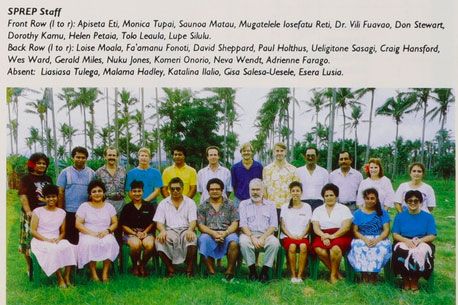
SPREP staff who replaced me, on arrival in Samoa in 1992
Overview
Our first year in France, 1985, we stayed in Brittany, until we decided to settle in Savoie in the Alps south of Geneva. I continued as a consultant to international organizations and governments. When UNEP transferred its Regional Seas Programme to Nairobi, almost everyone resigned. The Director, Stjepan Keckes, a talented scientist and dedicated international civil servant, was finally convinced to move to Nairobi and re-establish the Oceans and Coastal Areas Programme, and he asked me, with my experience in the Pacific, to come to Nairobi on regular consultancies over the next three years to help recruit and train the new staff.
Chronology
In 1985 I was a participant in a conference in the Netherlands on Environment and Development: Opportunities in Africa and the Middle East, and made consultant visits to IUCN, Switzerland and the IUCN Conservation Monitoring Centre in Cambridge, U.K., to prepare a 300 page IUCN Review of the protected areas system in Oceania including a list of all the islands in the region (published in 1986).
In 1986, UNEP asked me to help re-establish the Regional Seas Programme as the Oceans and Coastal Areas Programme Activity Centre in Nairobi, Kenya, after its transfer from Geneva, spending half of my time there on three-month consultancies. I published an article on Coastal ecosystems and rapid sea-level rise in the UNEP Regional Seas newsletter The Siren. I presented an invited paper on Special problems in coastal-zone management on tropical islands in the Symposium on Ecological Management of Coastal Zones at the IV International Congress of Ecology in New York, U.S.A., and participated in a meeting of the IUCN Commission on Ecology, as well as the International Society of Reef Studies Meeting in Germany.
In addition to my regular consultancies with UNEP in Nairobi in 1987, I participated in a UNESCO-IUBS Commission on Biology Education workshop in Bangsaen, Thailand, which led to my contributing a chapter on The marine environment to UNESCO publications on Field Work in Ecology for Secondary Schools in Tropical Countries and Field Work in Marine Ecology for Secondary Schools in Tropical Countries (1990). I was also a Fellow at the Environment and Policy Institute of the East-West Center, Hawaii; a UNEP Symposium organizer and chairman at the XVI Pacific Science Congress in Seoul, Korea and an invited participant in a CNES-France Espace remote sensing meeting in Singapore. Finally, I made lecture tours for European Environment Year in France, Belgium, and the Netherlands.
My consultancies with UNEP continued in 1988. UNEP asked me to edit a Regional Seas Report on Co-operation for Environmental Protection in the Pacific including my chapters on The need for and potentials of inter-regional co-operation and Discussion on inter-regional co-operation. I was a workshop leader and participant in the IUCN General Assembly in San Jose, Costa Rica, and a symposium organizer and chairman, and presented papers at the 6th International Coral Reef Symposium in Townsville, Australia, including Are human impacts, either through traditional or contemporary uses, stabilizing or destabilizing to reef community structure? with Bernard Salvat, and, with Lionel Loubersac and others Impact assessment of Cyclone Sally on the almost-atoll of Aitutaki (Cook Islands) by remote sensing. IUCN sent me as a consultant to the Government of Vanuatu to prepare a prospectus for a Vanuatu National Conservation Strategy. I continued as a consultant to the UNEP Oceans and Coastal Areas Programme Activity Centre in Nairobi, and lectured to a UNESCO/UNEP Workshop in Mauritius on Environment in Eastern Africa. My consultancy to the World Tourism Organization/UNDP project for marine park development in Comoros in December 1988 produced Ressources côtières, reserves marines et tourisme aux Comores.
In its preparations for joining the Alliance of Religions and Conservation, the Bahá'í International Community asked me to prepare A Bahá'í Perspective on Nature and the Environment which I also published in French as Les perspectives baha'ies sur la nature et l'environnement. I also found time to revise my work on Traditional environmental knowledge and resource management in New Caledonia for an IUCN book on Traditional Ecological Knowledge (1989).
Overview
Towards the end of my regular consultancies with UNEP in Nairobi, I was invited to apply to become Deputy Director of the Oceans and Coastal Areas Programme, and thus became a United Nations staff member in 1989, moving to Nairobi, Kenya, and helping countries around the world to protect their oceans and coastal areas. The Director and founder of the Regional Seas Programmes, Dr. Stjepan Keckes, was a wonderful Yugoslav marine scientist devoted to the values of the UN Charter, who believed we were there to serve governments and should take no personal credit for a programme that was considered the "crown jewel" of UNEP. When the UN was organizing the United Nations Conference on Environment and Development, the Rio Earth Summit in 1992, I was seconded to the secretariat and drafted chapter 17 of Agenda 21 on oceans, coasts and small islands, helping to launch the concept of Small Island Developing States. I also prepared a Directory of Islands of the world for IUCN and UNEP.
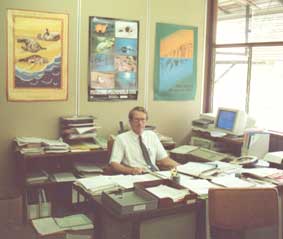
In my office in UNEP Nairobi
Chronology
Building on my consultancies with UNEP, in early 1989 I was appointed Deputy to the Director of the Oceans and Coastal Areas Programme Activity Center (OCA/PAC) of UNEP and moved from France to Nairobi, Kenya. This involved many functions in the supervision of Regional Seas Programmes involving 140 countries around the Mediterranean, the Red Sea, the Persian/Arabian Gulf, East Africa, West Africa, South Asia, South-East Asia, my own programme in the South Pacific, the South-East Pacific along Latin America, and the Caribbean. For example, I organized a Workshop on Island Conservation in Monaco, represented UNEP at the International Whaling Commission in San Diego, the International Maritime Organization in London), and the Pacific Science Association Intercongress in Santiago, Chile. I was on the Programme Technical Advisory Group of the World Conservation Monitoring Centre in Cambridge, UK, a participant in an Interagency Meeting on Oceans and Coastal Areas in Geneva, and directed Expert and Intergovernmental Meetings on the Eastern African Action Plan in Nairobi. I also did what I could to support the vibrant Bahá'í community in Kenya.
This work continued in 1990, when I organized and chaired the Marine Mammals Planning and Coordinating Committee meeting in Geneva, represented UNEP at the Indian Ocean Commission Committee on Environment in Moroni, Comoros, at the Intergovernmental Panel on Climate Change (IPCC) Working Group 2 meeting in Moscow, and at the London Dumping Convention. I returned to the Pacific for the Intergovernmental Meeting on the South Pacific Regional Environment Programme in Noumea, New Caledonia. I was invited to be a speaker and workshop organizer on the Application of the LME approach within regional seas areas at a scientific Conference on Large Marine Ecosystems in Monaco, producing a book chapter as well: The Large Marine Ecosystem approach to Regional Seas Action Plans and Conventions: a geographic perspective (1993). Finally, I chaired the Interagency Consultation on Oceans and Coastal Areas Programmes which we organized in Paris.
On the Bahá'í side, I lectured at an Environmental Symposium at a Bahá'í Institute in Landegg, Switzerland, and wrote a book, Unless and Until: a Baha'i focus on the environment, which has also been published in Azerbaijani, Russian, Spanish and Italian. Another effort to bridge the scientific and the spiritual was a chapter on The world order of nature in the book Emergence: Dimensions of a New World Order (1991).
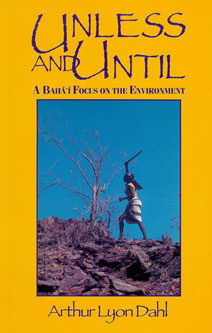
In 1991, with my experience in the Pacific and my interest in islands in general, I took part in the Intergovernmental and Contracting Parties meetings on the South Pacific Regional Environment Programme in Noumea, and contributed a paper on Regional and inter-regional co-operation for the protection of the marine and coastal environment of the Pacific basin to a UNEP publication. My long work on islands came to fruition with the publication of my 500 page IUCN/UNEP Island Directory as a UNEP Regional Seas Directory.
As the momentum built in 1991 towards the United Nations Conference on Environment and Development (UNCED) planned for 1992, I participated for UNEP in the UNCED Working Party on Oceans meetings in Geneva and Monaco, as well as organizing another meeting of the Marine Mammal Planning and Coordinating Committee at Greenpeace headquarters in Amsterdam. I then represented UNEP at the UNCED Preparatory Committee meetings in Nairobi and Geneva, and finally was seconded to the Secretariat for UNCED in Geneva to assist in preparing Agenda 21 for adoption at the "Earth Summit" in Rio de Janeiro. Maurice Strong, Secretary-General of the Conference, as he had been of the Stockholm Conference twenty years before, and had visited me in Nairobi in 1974, wanted me to draft a strong section on Small Island Developing States, and I ended up doing the final drafting of the whole chapter on Oceans and Coastal Areas. In my work preparing for UNCED, I wrote or supervised the drafting of the following documents: Mechanisms for capacity building, Issues and requirements of small island countries for sustainable development and environment in agriculture, forestry and fisheries, Agriculture, forestry and fisheries in small island countries within the framework of UNCED Agenda 21, and finally Agenda 21 Chapter 17: Protection of the oceans, all kinds of seas, and coastal areas and the protection, rational use and development of their living resources.
Overview
UNEP transferred me permanently to Geneva in March 1992 as Coordinator of the UN System-Wide Earthwatch. I also became Deputy Assistant Executive Director of the Division of Early Warning and Assessment. Earthwatch was the name given to the environmental assessment part of the action plan agreed at the Stockholm Conference in 1972. The function was reinforced by UN General Assembly resolutions, and incorporated in Agenda 21, Chapter 40 on Information for Decision-making, as a UN system-wide process to monitor and assess the global environment. I was charged to implement this across the whole UN system in collaboration with the scientific community, and was responsible for Chapter 40 as Task Manager in reporting to the Commission on Sustainable Development. UN agencies, like most bureaucracies, do not like to be "coordinated", but as a one-person office with a half-time secretary, I was not threatening or empire-building. I had no money or power, and was not responsible to anyone in particular, but I felt like an orchestra conductor who could suggest a piece to play, set a tempo, and see what emerged. I organized meetings of an interagency Earthwatch Working Party, and because we found useful things to collaborate on that made everyone look good, it worked. I taught myself to make an Earthwatch web site that showed what the whole UN system was doing to observe and protect the planetary environment, even featured by Time magazine as the place to go in the UN on this topic. I worked closely with the UN Division of Sustainable Development in New York. One major effort was to implement the request in Chapter 40 for indicators of sustainable development that governments could use to measure progress, so I catalyzed and helped to lead that process, both within the UN and through the Scientific Committee on Problems of the Environment (SCOPE).
In 2000, the UNEP Executive Director decided to terminate my contract two years before retirement, because he assumed that the head of a unit with no staff must be deadwood, when my division director said I was doing nine full-time jobs. Then he decided that UNEP should do something to save coral reefs, so instead of being fired I was named Director of a new Coral Reef Unit until my retirement in 2002. This involved designing and launching an International Coral Reef Action Network (ICRAN) between coral reef scientists, NGOs and interested governments, for which I raised $12 million. This was a constructive way of demonstrating that I was not deadwood.
Chronology
One of the proposals that I included in Agenda 21 Chapter 17 was the holding of a conference of all the Small Island Developing States around the world so that they could see what problems they had in common and work together to share experience and find common solutions: UNCED and small islands. FAO liked the idea and asked me in early 1992 to help prepare an Inter-regional Conference of Small Island Countries on Sustainable Development and Environment in Agriculture, Forestry and Fisheries in April 1992 in Christ Church, Barbados, to consider Issues and requirements of small island countries for sustainable development and environment in agriculture, forestry and fisheries, and to represent UNEP and present a paper on Agriculture, forestry and fisheries in small island countries within the framework of UNCED Agenda 21. Meanwhile, UNEP transferred me from Nairobi to Geneva, Switzerland, in March 1992 as Deputy Co-ordinator (and then Coordinator) of the UN System-wide Earthwatch called for in Agenda 21. In this role, I represented UNEP at the Joint Scientific and Technical Committee of the Global Climate Observing System in Geneva, and, to start working on indicators, participated in a World Resources Institute Workshop on Environmental Indicators in Washington, D.C., as well as attending an International conference on 'Antarctica, the Environment and the Future' at the University of Geneva. At the 7th International Coral Reef Symposium on Guam, I gave a paper on Organizing the global monitoring of coral reefs. Another interesting project in which I became heavily involved was the South Pacific Biodiversity Conservation Programme funded by the Global Environment Facility, intended to help 14 Pacific Island countries to develop locally managed protected areas for biodiversity conservation. I started as the leader of UNDP Appraisal Team for the project, meeting in Western Samoa, and ended up working with the project through its successful conclusion five years later.
In 1993, I represented UNEP at the Preparatory Committee in New York for the Global Conference on Sustainable Development of Small Island Developing States planned for Barbados in 1994. I was also named to chair the Technical and Management Advisory Group for the GEF/UNDP/SPREP South Pacific Biodiversity Conservation Programme with its first meeting in Apia, Samoa. For Earthwatch coordination, I organized the UNEP/UNSTAT Consultative Expert Group on Environment and Sustainable Development Indicators meeting in Geneva, presenting on Environmental and sustainable development indicators: some points for discussion. We invited Bedrich Moldan, a vice-chair of the first session of the UN Commission on Sustainable Development, founder of the Environment Center at Charles University in Prague, chair of the Scientific Committee on Problems of the Environment (SCOPE) of the International Council of Scientific Unions, and first Minister of the Environment in the new Czech Republic, to chair the meeting, as he bridged science and diplomacy, and we became good friends during the long indicators process. I was invited to prepare an important paper on Land-based pollution and integrated coastal management for a special issue of Marine Policy on UNCED's marine agenda: the challenges of implementation, and another paper on the role of natural history museums in UNCED implementation: Una nueva misión para los museos de Ciencias Naturales en relación con los cambios ambientales a largo plazo.
From a more Bahá'í perspective, I presented a paper at the European Baha'i Business Forum meeting in Landegg, Switzerland, and another at the Association of Bahá'í Studies for French-speaking Europe in Geneva on Les valeurs écologiques, as well as a book review Environnement: Patrimoine de l'Humanite, a more personal article on my experience in the Pacific: Planting seeds: personal reflections on the importance of small beginnings, and a book Preface for Farlan Carré's La Fin du Monopole de la Richesse.
In 1994, to involve the scientific community in work on indicators of sustainable development in support of the intergovernmental process at the UN, the Scientific Committee on Problems of the Environment (SCOPE) chaired by Bedrich Moldan organized a project on indicators of sustainable development with me as a member of its scientific advisory committee. This provided strong scientific support to the challenge of designing indicators that would be both scientifically valid and acceptable to governments, particularly those of developing countries that were afraid that indicators could be used for conditionality in donor funding. I also participated in a World Bank Workshop on Indicators of Sustainable Development in Washington, D.C., and organized the first inter-agency Earthwatch Working Party in Geneva to coordinate efforts across the UN system and with the scientific community. When GATT (now the World Trade Organization), first opened to the outside with a GATT symposium on Trade, Environment and Sustainable Development, I presented a paper on Global sustainability and its implications for trade. The Institute for Spiritual Foundations of World Civilization at the Ukrainian Academy of Sciences for National Progress in Kiev, Ukraine invited me in May 1994 to give a series of seminars on Social crises and their connections to global environmental problems. I again chaired the South Pacific Biodiversity Conservation Programme Technical and Management Advisory Group in Apia, Western Samoa. At a Symposium on Ecology and Democracy: The Challenge of the 21st Century, in Ceske Budejovice, Czech Republic, I presented a paper on Ecological models of social organization: a Baha'i perspective.
To address the political challenges raised by the proposed work programme on indicators of sustainable development, we organized two workshops in 1995, one bringing together key diplomats from the Commission on Sustainable Development (CSD) with relevant scientists, the other addressing the scientific challenges. The first was the SCOPE/UNEP International Workshop on Indicators of Sustainable Development in Ghent, Belgium, where I presented a UNEP/DPCSD discussion paper on The role of indicators in decision-making. The second was the SCOPE Scientific Workshop on Indicators of Sustainable Development, Wuppertal, Germany, where I gave the opening address, a key conceptual paper Towards indicators of sustainability (published in UNEP's magazine Our Planet in 1996 as Measuring the unmeasurable) as well as a Framework of sustainability issues from Agenda 21. I was also a participant in the UN Inter-Agency Committee on Sustainable Development, organized another inter-agency Earthwatch Working Party in Geneva, prepared a working paper Information for decision-making and Earthwatch, Report of the Secretary-General to the UN Commission on Sustainable Development, Third Session, and was part of the UNEP delegation to the CSD. In addition, I served as a member of the Programme Advisory Group for the World Conservation Monitoring Centre meetings in Cambridge and Gland, Switzerland, an invited expert at a European Commission meeting in Brussels on Earth Observations in developing countries, presented a paper on The moral dimension of sustainable consumption at a UNEP-ROE Roundtable Discussion on Sustainable Production and Consumption in Europe in Geneva, was a discussion group leader at the Third Scientific Symposium on Human Dimensions of Global Environmental Change in Geneva, and again chaired the South Pacific Biodiversity Conservation Programme Technical and Management Advisory Group meeting in Port Vila, Vanuatu.
WWF organized a World Summit on Religions and Conservation at Windsor Castle, UK, hosted by Prince Phillip, with leaders of all the major religions. To present the issues to the religious leaders, I was invited on behalf of UNEP, along with head of environment at the World Bank, the Director of the BBC World Service, and the economist Susan George. After four days of discussions in the library where William Shakespeare first performed "The Merry Wives of Windsor", all the religions agreed that they shared the same values of stewardship for the natural environment, leading to the organization of an Alliance of Religions and Conservation.
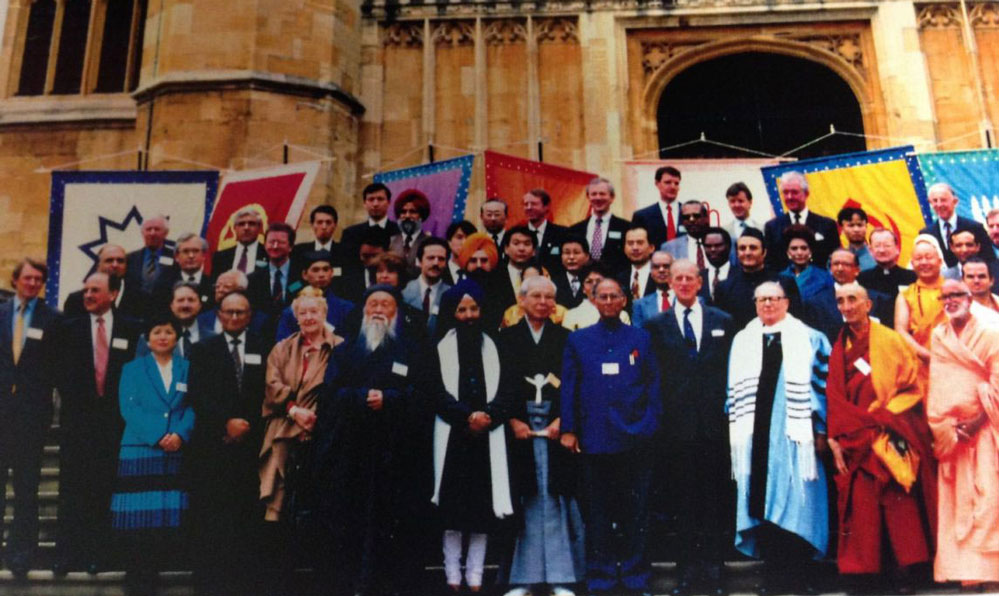
Summit of Religions and Conservation, Windsor Castle 1995, with Bahá'í representatives Ruhiyyih Khanum and Kimiko and John Schwerin front left, Lawrence Arturo in the middle, and me in the center back row
I was also an invited speaker at a Colloquy on Ecology, Ethics and Spiritualities, organized by Pax Christi in the village of Klingenthal in Alsace, France, speaking on The Bahá'í approach: moderation in civilization. This was the first of a series of such meetings in subsequent years on various relevant themes.
My Earthwatch activity continued in 1996, participating in the cosponsors meeting on a Global Terrestrial Observing System in Rome with a paper later published as Earthwatch: an introduction to the UN system-wide coordination of environmental observation. I organized inter-agency meetings including another Earthwatch Working Party and a Meeting on Common/compatible systems of access to data in New York, contributed to an Expert Meeting on Methodologies for Indicators of Sustainable Development in New York, organized a Workshop on Information for Sustainable Development and Earthwatch in Geneva, co-led a Data for global change: discussion group at the Human Dimensions of Global Environmental Change Programme's Third Scientific Symposium, chaired a Technical Meeting on a Clearing-house for the Global Plan of Action for the Protection of the Marine Environment from Land-based Activities in Geneva with a paper on Initial Implementation of the clearing house mechanism, was a major session speaker at the Second International Workshop on Indicators of Sustainable Development in Ghent, Belgium, and an invited participant in a Conference on Principles of Sustainable Development Performance Measurement in Bellagio, Italy, which published the Bellagio Principles as guidelines for future work on indicators. I was also a lecturer for an AIESEC Planet Club in Hungary, for a women's conference in Adana, Turkey and on Spiritual Dimensions of Sustainable Development at a high-level Workshop on Sustainable Development and International Cooperation hosted by the President of Romania in Bucharest. There was also time to participate in the 6th International Coral Reef Symposium in Panama, and chair the Fourth Technical and Management Advisory Group of the South Pacific Biodiversity Conservation Programme in Apia, Western Samoa. Finally, to synthesize my own thinking about how a systems approach could shed light on the complex problems between the environment and economics in the framework of a Bahá'í view of the evolution of future society, I published a book, The Eco Principle: Ecology and Economics in Symbiosis (also in Portuguese and Spanish).
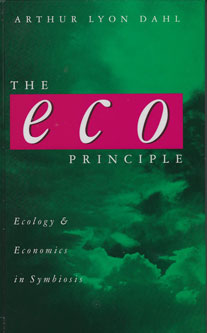
With three Global Observing Systems being organized in 1997 for climate, oceans and terrestrial monitoring, it was important to improve coordination, so I organized and chaired a Sponsors Group for the Global Observing Systems (GCOS, GOOS, GTOS) in Geneva. That year I was a keynote speaker at an International Ecological Congress in Almaty, Kazakstan, a participant in Expert Workshops for the Global International Waters Assessment in Geneva, an invited speaker at a WWF Pre-Earth Summit Forestry Gathering in Athens, Greece, a facilitator and speaker at a Regional Capacity 21/DPCSD Workshop on Indicators of Sustainable Development in Accra, Ghana, a participant in the Intergovernmental Committee for the Global Ocean Observing System in Paris, the Committee on Earth Observation Satellites (CEOS) Plenary in Toulouse, France, and a UN Expert Meeting on Island Vulnerability Indicators in New York, as well as a panel member at the Symposium on Information for Humanitarian Coordination in Geneva. The SCOPE indicators project published a book with its results, Sustainability Indicators: A Report on the Project on Indicators of Sustainable Development in which I had chapters on The Big Picture: Comprehensive Approaches - Introduction and From concept to indicator: dimensions expressed as vectors. I also chaired the Fifth Technical and Management Advisory Group of the South Pacific Biodiversity Conservation Programme in Apia, Samoa.
I was equally active in the domain of science and religion. His All Holiness the Ecumenical Patriarch Bartholomew I of the Orthodox Church, and His Excellency Mr. Jacques Santer, President of the European Commission, organized a Conference on Religion, Science and the Environment: The Black Sea in Crisis, for 200 religious leaders, scientists and international officials on a ship sailing around the Black Sea from Turkey to Georgia, Russia, Ukraine, Romania, Bulgaria and finally Greece on 20-28 September 1997. I was a participant and finally the rapporteur charged with drafting The Black Sea Declaration capturing the conclusions of the conference and presented at the closing session. I also organized an Ethics Forum on the Environment at the Landegg Academy in Switzerland, as well as our first International Baha'i Conference on the Environment at de Poort, the Netherlands, in October 1997, speaking on Sustainable development and the environment of the world: an overview. This conference marked the founding of the International Environment Forum as a Bahá'í-inspired professional organization for the environment and sustainability. I was an invited speaker at the Second Klingenthal Symposium "L'Eau" (water) at Klingenthal, France, presenting papers on The Baha'i Perspective on Water and New orientations in socio-economic approaches to water. Other articles included The ecology of economics, The Baha'i Faith: a future oriented religion (Future Generations Journal) and Environmental Protection. The Bahá'í Perspective (Naturopa).
My work on Earthwatch coordination continued in 1998 as a participant in the Consultative Group on Sustainable Development Indicators in Washington, D.C. bringing together a few key experts such as Donella Meadows (Limits to Growth), Joachim Jensinghouse (EU), Peter Bartelmus (UNSTAT), Peter Hardi and Laszlo Pinter (IDRC) and others to provide intellectual guidance to the indicators process. I was also a facilitator at the Fourth International Workshop on Indicators of Sustainable Development in Prague, Czech Republic; a member of the steering committee and participant in an OECD Workshop on Agro-environmental Indicators in York, U.K.; the organizer and chair of the fourth Earthwatch Working Party in Geneva; an invited participant in a SCOPE meeting on environmental issues, problems and opportunities of the post-industrial information society in Paris; a member of the Steering Committee of the Global Ocean Observing System (GOOS) in Paris; a participant in the Sponsors Group for Global Observing Systems, and First Integrated Global Observing Strategy Partners Meeting in Paris; a participant in the GESAMP Working Group on Marine Environmental Assessments in Geneva; a panel co-chair and speaker on IGOS from the perspective of the Global Observing Systems and their Sponsors at the 27th International Symposium on Remote Sensing of the Environment on "Information for Sustainability" in Tromso, Norway; the representative of UNEP at the SCOPE General Assembly in New Jersey, and at the Committee on Earth Observation Satellites (CEOS) Plenary and Second Integrated Global Observing Strategy Partners Meeting in Bangalore, India. I also chaired the Sixth Technical and Management Advisory Group, of the South Pacific Biodiversity Conservation Programme in Port Vila, Vanuatu.
The International Jacques Maritain Institute in Milan invited me to speak on Globalization and the Environment at its International Seminar "Globalization: a challenge for peace; solidarity or exclusion". I organized and gave a keynote on Sustainable consumption and true prosperity at the second International Conference of the Environment Forum at de Poort, the Netherlands. I was an invited featured speaker at a Beas Foundation Seminar on my book "The Eco Principle: Ecology and Economics in Symbiosis" at Bryn Mawr, Pennsylvania, and at the Third Klingenthal Symposium on "Soil, Cultures and Spiritualities" with a paper on Soil in the Baha'i Faith, leading to my being named as a Bahá'í a member of an official Pax Christi France working group on the creation to prepare a declaration for the Social Council of Bishops, Paris, France, and the next year as a member of the Commission on Peace, Ecology and Sustainable Development in the Centre for Research on Peace of the Institut Catholique de Paris, which finally published a collective work Développement durable et devenir de l'homme : un enjeu pour la paix in 2002. I contributed a paper on Spiritual dimensions of sustainable development to a Global Dialogue on Microfinance and Human Development organized by the European Bahá'í Business Forum in Stockholm, Sweden. I created online versions of my Island Directory and of my Small Island Environmental Management Training Course, and wrote an article on Civilization Under Threat for Herald of the South.
In 1999 I was an invited participant in an FAO/Australian Technical Consultation on Sustainability Indicators in Marine Capture Fisheries in Sydney, Australia; partially chaired the Fifth Expert Group Meeting on Indicators of Sustainable Development in New York; organized the Fifth Meeting of the Earthwatch Working Party in Geneva; participated in the Sponsors Group for the Global Observing Systems, and Third Integrated Global Observing Strategy Partners Meeting in Rome; was a keynote speaker and panelist at the IGOS Partnership Forum on "Integrated Global Observing Strategy (IGOS): Into the New Millennium" at UNISPACE III in Vienna, Austria, speaking on Global Observations: Responding to User Needs; and chaired the Seventh Technical and Management Advisory Group of the South Pacific Biodiversity Conservation Programme in Apia, Samoa.
At the third Conference of the International Environment Forum, cosponsored by the Bahá'í Agency for Social and Economic Development - United Kingdom (BASED-UK) in Sidcot, England, I was an organizer and keynote speaker on Living within environmental limits: implications of Baha'i principles for sustainable development and on Community-based environmental management: empowering people with environmental understanding. I received an adjunct appointment to the faculty of Landegg Academy (later Landegg International University) in Weinacht, Switzerland; was again a keynote speaker at the AIESEC Planet Club Conference in Hungary; and an invited speaker at the Fourth Klingenthal Symposium "L'Arbre - le foret" in Klingenthal, France, on The Baha'i approach to trees and forest; and at the Bahá'í Seminar and Conference on Social and Economic Development in the Americas, Orlando, Florida; while publishing When is enough, enough? Sustainable Consumption and True Prosperity in Herald of the South.
My work on Earthwatch Coordination continued through most of 2000, organizing a UNEP Planning Workshop on Environmental Information Systems, and the Sixth Meeting of the Earthwatch Working Party in Geneva; participating in the Global Environment Outlook (GEO-3) Production Meeting in Bangkok, and the Global Ocean Observing System Steering Committee in Paris; serving as an invited expert in a meeting on the Impact of Information on Decision-making Processes in Arendal, Norway; participating in the Sponsors Group for Global Observing Systems, and Fifth Integrated Global Observing Strategy (IGOS) Partners Meeting in Geneva reporting on IGOS and the Conventions; an invited keynote speaker at the International Colloquium on Sustainable Development and Information for Decision-making in St. Etienne, France; co-organizer of an International Expert Meeting on Information for Decision-making in Ottawa, Canada; participating in the Global UNEP Network Design and Implementation Meeting in Redlands, California; serving in the secretariat for the Integrated Global Observing Strategy Partnership meeting, and as UNEP representative in the Committee on Earth Observation Satellites Plenary in Rio de Janeiro, Brazil; and publishing Using indicators to measure sustainability: recent methodological and conceptual developments in Marine and Freshwater Research.
In November I was named Director of a new UNEP Coral Reef Unit until my retirement in 2002. This involved designing and launching an International Coral Reef Action Network (ICRAN) between coral reef scientists, NGOs and interested governments, for which I participated in an International Coral Reef Action Network Partners Meeting in Penang, Malaysia, and the International Coral Reef Initiative (ICRI) Coordination and Planning Committee meeting in Noumea, New Caledonia, as well as the 9th International Coral Reef Symposium and International Coral Reef Initiative Coordination and Planning Committee in Bali, Indonesia. I also chaired the Eighth Technical and Management Advisory Group of the South Pacific Biodiversity Conservation Programme in Wellington, New Zealand.
On the more values-oriented side, I was keynote speaker at the Second AIESEC Planet Club Conference in Veroce-Kismaros, Hungary; an invited speaker at an International Conference on Human Habitat and Environment at the Landegg Academy, Switzerland; and a keynote speaker on Applying the Bahá'í Teachings to the environmental challenges facing the world at the Fourth Conference of the International Environment Forum, and Seminar-Conference on Social and Economic Development in the Americas in Orlando, Florida.
My work in 2001 was divided between my new UNEP function Directing the Coral Reef Unit and continuing my support to Earthwatch Coordination. For the former, I chaired the Scientific Advisory Committee for the National Caribbean Coral Reef Research Center (NCORE) in Miami, Florida; chaired the Steering Committee for International Coral Reef Action Network (ICRAN), and represented UNEP in the International Coral Reef Initiative (ICRI) Coordination and Planning Committee and ICRI Regional Workshop in Cebu, Philippines; participated in the ICRAN Regional Seas Meeting on Bonaire, Netherlands Antilles; the NCORE Workshop on Priorities for Caribbean Coral Reef Research, and chaired the NCORE Scientific Advisory Committee in Miami, Florida; was part of the Global Islands Network Working Group in Hamburg, Germany; chaired the ICRAN Steering Committee, and participated in the ICRI Coordination and Planning Committee and ICRI Regional Workshop, and organized an Integrated Global Observing Strategy (IGOS) Coral Reef Theme team meeting in Maputo, Mozambique; as well as holding consultations with the Madagascar government and other partners on coral reef action.
For Earthwatch, I was a keynote speaker and panelist at the Environment 2001 Conference in Abu Dhabi, United Arab Emirates, on Global Environmental Approaches and Global initiatives in support of remote sensing and GIS; UNEP representative and part of the secretariat for the Commission on Sustainable Development Intersessional Working Group on Information for Decision-making, and ninth session of Commission on Sustainable Development in New York; participant in the Sponsors Group for the Global Observing Systems, and and Integrated Global Observing Strategy (IGOS) Partners Meeting in Paris; an invited participant in a Workshop on the Environmental Sustainability Index for the World Economic Forum in Geneva; participant in the SOPAC/UNEP Global Environmental Vulnerability Indicators Meeting in Geneva, and co-author of a paper on Globalising the Environmental Vulnerability Index (EVI); UNEP representative to the Committee on Earth Observation Satellites (CEOS) Plenary and Integrated Global Observing Strategy (IGOS) Partnership in Kyoto, Japan; member of the UNEP delegation to the Subsidiary Body for Scientific, Technical and Technological Affairs of the Convention on Biological Diversity in Montreal, Canada; and chaired the Earthwatch Working Party in Geneva.
On the side, I organized and was keynote speaker at the Fifth Conference of the International Environment Forum in Hluboka nad Vltavou, Czech Republic, presenting on Values as the foundation for sustainable behaviour and From Stockholm via Rio to Johannesburg: Thirty years of international action on environment and sustainable development; was an invited lecturer at the Royal Commonwealth Society and the London School of Economics in London; and a keynote speaker at the EBBF - European Bahá'í Business Forum Annual Conference in the Netherlands; spoke at the Fifth Klingenthal Symposium: l'animal et la faune in Klingenthal, France on The Baha'i attitude towards animals; provided a Preface for Foad Katirai's Global Governance and the Lesser Peace; and had an Interview published in Coastal Discovery, the Journal of the Marine Science Institute of the University of California, Santa Barbara, where I earned my doctorat.
My action for coral reefs and Earthwatch in 2002 continued up to my retirement from the UN in August, involving co-organizing a Coral Reef Theme team meeting for the Integrated Global Observing Strategy (IGOS), and speaking at a Workshop on Satellite Oceanography and Coral Bleaching on Magnetic Island, Australia; UNEP delegate to the 3rd Preparatory Committee for World Summit on Sustainable Development in New York; UNEP representative to the Sponsors Group for Global Observing Systems, and Integrated Global Observing Strategy (IGOS) Partnership in Paris; participant in the International Coral Reef Action Network (ICRAN) Steering Committee, UNEP representative to International Coral Reef Initiative (ICRI) Coordination and Planning Committee and ICRI Regional Workshop, and organizer of an IGOS Coral Reef Theme team meeting in Cancun, Mexico; and chairing the Scientific Advisory Committee of the National Caribbean Coral Reef Research Center, University of Miami, and participating in a Workshop on the Future of Decision-support for Coral Reef Management, Miami, Florida. Some of this I wrote up as IGOS Coral Reef Theme in Reef Encounter, Monitoring Coral Reefs: Ecosystems in Crisis in the IHDP Newsletter, and Coral Reefs: a New IGOS Sub-theme in the IGOS Bulletin. Other contributions were as an invited speaker at the World Civil Society Forum, Geneva; a lecturer at the Centre of Human Ecology, University of Geneva, and for a graduate programme, Federal Polytechnic University of Lausanne; and as Commencement Speaker at Landegg International University, Switzerland.
My professional career ended at the World Summit on Sustainable Development in Johannesburg, South Africa. The first week, as a UNEP official, I represented the International Coral Reef Action Network (ICRAN) as a type-two partnership for coral reefs featured at the summit with the collaboration of the UN and the scientific community, and organized an ICRI/ICRAN parallel event. The second week I had retired and represented the International Environment Forum (IEF) which was accredited to the summit as a scientific/technological organization.
Overview
At the time that I joined the United Nations, the retirement age was 60, so in August 2002, I had to retire. In fact I was attending the UN World Summit on Sustainable Development in Johannesburg, South Africa. The second week I had retired, and headed the delegation of the International Environment Forum (IEF), our Bahá’í-inspired professional organization which was accredited by the UN in the science and technology major group. I organized and spoke at a Dialogue on Indicators of Sustainability at the WSSD Science Forum, at a panel on Multiple Dimensions of Globalization at the IUCN Environment Centre, at a panel on Science at the Local Level at the University of Witwaatersrand, and at an event for the business community.
For two years after retirement I was a consultant to UNEP with activities that were an extension of what I had done before. UNEP continued for 8 years to provide me with an office for my projects with them, especially as Coordinator of the UNEP/University of Geneva/Graduate Institute Environmental Diplomacy Programme (2005-2009). I also had consultancies with other international organizations and the French oceanography agency IFREMER. Later I was a consultant to the World Economic Forum and the World Bank as well as UNEP. Part of my time was also devoted to IEF activities.
Most recently, with two friends, the economist Augusto Lopez-Claros and the international law expert Maja Groff, we prepared proposals to reform the United Nations that won the New Shape Prize of the Global Challenges Foundation in 2018, and we went on to write a book on the subject, Global Governance and the Emergence of Global Institutions for the 21st Century (Cambridge University Press, 2020).
Chronology
For the International Environment Forum (IEF) events at the 2002 World Summit on Sustainable Development in Johannesburg, South Africa, I organized and spoke on the Usefulness of Indicators for Sustainability at our Dialogue on Indicators of Sustainability at the WSSD Science Forum, on Environmental and Ecological Dimensions of Globalization at our panel on Multiple Dimensions of Globalization at the IUCN Environment Centre, and on Linking science and indigenous knowledge for community environmental management at our panel on Science at the Local Level at the University of Witwaatersrand.
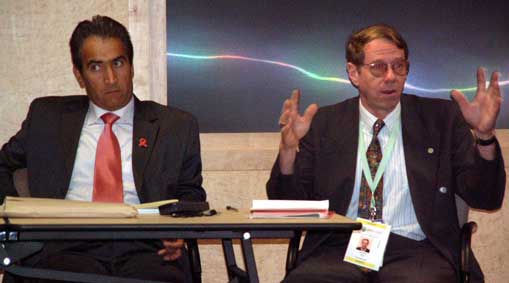
Speaking at an International Environment Forum seminar at the UN World Summit on Sustainable Development in Johannesburg in 2002
I was also a speaker at the EBBF - European Bahá'í Business Forum annual conference in the Netherlands and an EBBF national conference in Sofia, Bulgaria, with lectures at various universities in Bulgaria. I wrote a brochure for EBBF on The Challenge of Sustainable Development and Prosperity (also translated into French and Bulgarian); a chapter on The Environment and the Lesser Peace for a book on Processes of the Lesser Peace; and with my friend Sylvia Karlsson an opinion article on It's time to broaden the debate for the Science and Development Network.
UNEP offered me a consultancy in 2003 to continue some of my previous activities, so I again chaired the Scientific Advisory Committee of the National Caribbean Coral Reef Research Center at the University of Miami; participated in the Sponsors Group for the Global Observing Systems and the Integrated Global Observing Strategy Partnership in Paris, giving a paper on behalf of FAO on The IGOS partnership and emerging themes: A review of strategic choices and areas of concentration and as co-leader of the theme team, presented our IGOS Coral Reef Sub-theme Report for final approval. I was involved in the Annual meeting and Governing Board meeting of the Global Islands Network on the Isle of Skye, UK; the Integrated Global Observing Strategy Coastal Theme Workshop in Hamilton, New Zealand; the Global Forum on Oceans, Coasts and Islands at UNESCO in Paris; an Expert Think Tank Meeting on Establishing an Intergovernmental Panel on Global Environmental Change in Oslo, Norway; presented on Coral Reefs: An Ecosystem under Global Stress at an International Conference on the Impact of Global Environmental Problems on Continental and Coastal Marine Waters at the University of Geneva; gave a paper on L'environnement sous haute pression : perspectives internationales pour la décennie à venir at the Colloque des 10 ans de l'ISIGE (Institut Supérieur d'ingénierie et de Gestion de l'Environnement) in Fontainebleau, France; and another on Social Sciences and the International Advisory and Assessment Process at a Special Session on Human Dimensions of Global Environmental Change Research and the Global Science Policy Interface at the International Conference on Social Science and Social Policy in the 21st Century in Vienna.
I was also freer to do things directly in support of Bahá'í communities, including participating in a WWF Seminar on Religion and Conservation at Mont Saint-Michel, France; giving lectures at the Ministry of Foreign Affairs and various universities in Madagascar (where my brother was IMF Resident Representative); lectures organized by EBBF at ten different universities in Adana, Ankara, Ismir and Istanbul in Turkey, and for Bahá'í communities in Brussels, London, Wiesbaden, Budapest, Poitiers, Chambery, and Luxemburg; and a keynote talk at the Festival de l'Avenir au Naturel, l'Albenc, France. I was a panelist at the EBBF - European Bahá'í Business Forum Annual Conference in The Netherlands, spoke at a EBBF Workshop at the World Summit on the Information Society in Geneva; and was co-organizer and speaker at the 7th Annual Conference of the International Environment Forum and Bahá'í Conference on Social and Economic Development in the Americas in Orlando, Florida, USA. I also contributed a chapter on Spiritualité et écologie, unité dans la diversité to a book on Approches Spirituelles de l'Écologie.
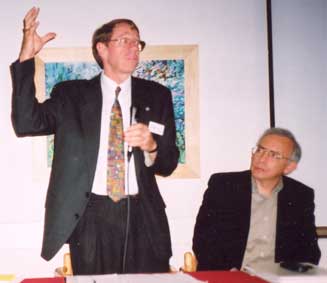
On a panel with Augusto Lopez-Claros at the ebbf - Ethical Business Building the Future Annual Conference, de Poort, the Netherlands, 2003
My work in 2004 clustered around several themes. The Earthwatch work included being an invited speaker at the Integrated Global Observing Strategy (IGOS) International Workshop, and participant in the Committee on Earth Observation Satellites (CEOS) Strategic Implementation Team meeting in Tokyo, Japan; participating in the Integrated Global Observing Strategy Coastal Theme Workshops at UNESCO in Paris and at the University of Miami, Florida, USA; advisor to the UNEP delegation and presenting a report on future strategy at the Global Observing Systems Sponsors Group and Integrated Global Observing Strategy (IGOS) Partners meetings at FAO in Rome. A number of activities concerned indicators, including serving as an invited expert for the South Pacific Applied Geoscience Commission (SOPAC) launch of our Environmental Vulnerability Index at the SIDS preparatory session of the UN Commission on Sustainable Development, and observer for the International Environment Forum at the CSD in New York; preparing the background paper and chairing a working group at the SCOPE/IHDP Workshop on Assessment of Sustainability Indicators at Charles University in Prague, Czech Republic; invited again as an expert and co-author of the Report on the Environmental Vulnerability Index (EVI) Think Tank II at the South Pacific Applied Geoscience Commission in Suva, Fiji, and leading a consultation on environmental governance at the Pacific Institute for Advanced Studies in Development and Governance at the University of the South Pacific in Suva, Fiji; and a participant in an Expert Workshop to review the Environmental Sustainability Index at Yale University in New Haven, Connecticut, as advisor to the World Economic Forum. My interest in coral reefs continued at the 10th International Coral Reef Symposium on Okinawa, Japan; again chairing the Scientific Advisory Committee of the National Caribbean Coral Reef Research Center at the University of Miami.
The World Economic Forum brought me in as a consultant to review their approach to environmental issues and allowed me to include 20 questions on environmental and social responsibility in their Executive Opinion Survey sent every year to 30,000 buisness leaders around the world. From the nearly 9,000 returns, it was clear that the most competitive companies and countries were also the most environmentally responsible, but it was important for government also to play its role in defining environmental regulations so that companies could innovate to respond to societies needs. I published the results as The competitive edge in environmental responsibility in The Global Competitiveness Report 2004-2005. With my friend Augusto Lopez-Claros we also prepared an op ed piece on Environmental Responsibility: Good for Business? published (in Portuguese) in O Globo, Rio de Janeiro, and other third world newspapers.
Other activities in 2004 included being an invited workshop speaker on Science and values as complementary foundations for consumer citizenship at the First International Conference of the Consumer Citizenship Network at UNESCO in Paris; a lecturer at the AIESEC National Conference on Ethical Leadership in London, and invited speaker at the AIESEC national conference in Fiesch, Switzerland; an invited panellist and speaker at the public meeting for the World Parliament of Religions in Barcelona, Spain; panellist at the EBBF - European Bahá'í Business Forum Annual Conference in The Netherlands; co-organizer and keynote speaker on Leading the Transition to Sustainability: Global Challenges and Individual Action, Environmental dimensions of sustainable lifestyles, and with Sylvia Karlsson Measuring Sustainable Lifestyles and Sustainability at the 8th Annual Conference of the International Environment Forum in Thessaloniki, Greece; and presenting Bahá'í lectures in Locarno, Switzerland and Bastia, Corsica.
A major event in 2005 was representing the Global Islands Network, the South Pacific Applied Geoscience Commission, the International Environment Forum (IEF), and the CSD Education Caucus at the Mauritius International Meeting on further implementation of the Programme of Action for Small Island Developing States, where I chaired side events for the International Coral Reef Initiative and the Education Caucus, and participated in the presentation of the SOPAC Environmental Vulnerability Index. I also represented IEF at the UN Commission on Sustainable Development in New York; presented a strategy paper at the Integrated Global Observing Strategy (IGOS) Partners meeting in Geneva; presented a paper on Good Governance and Competitiveness at an International Sustainability Conference in Basel; presented a University lecture and seminar at the University of Bari, Italy; and participated in the World Science Forum in Budapest. I also wrote a series of articles for the The Encyclopedia of Religion and Nature on Baha'i Faith and the United Nations, Brown, Vinson (1912-1991), Klingenthal Symposia, Men of the Trees (East Africa), and World Wide Fund for Nature (WWF). The World Economic Forum gave me another interesting assignment to prepare a report on how Taiwan had gone from a poor tropical island with no resources to a leading world economy in 50 years. I visited Taiwan and had access to leading experts in government and the private sector, and the results were published with Augusto Lopez-Claros as The Impact of Information and Communication Technologies on the Economic Competitiveness and Social Development of Taiwan in the INSEAD/WEF Global Information Technology Report 2005-2006: Leveraging ICT for Development.
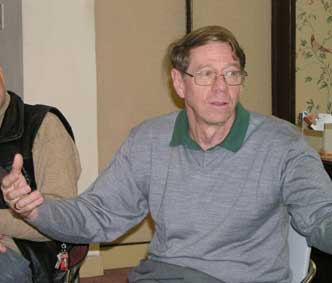
Speaking in Taipei, Taiwan in 2005 while preparing a report for the World Economic Forum on the economic success of Taiwan
The team working on the Coastal Theme for the Integrated Global Observing Strategy (IGOS) partnership published its report A Coastal Theme for the IGOS Partnership: For the Monitoring of our Environment from Space and from Earth in January 2006. UNESCO asked me to draft the first in a series of UNESCO/SCOPE Policy Briefs on Indicators of sustainability: reliable tools for decision making. I was also an invited lecturer for AIESEC national and regional conferences in Italy, the Czech Republic, United Kingdom and Macedonia; represented IEF at the UN Commission on Sustainable Development in New York; participated in a plenary panel at the 3rd International Conference of the Consumer Citizenship Network in Norway speaking on Scientific Foundations for Commitment and Consistency; spoke at the EBBF - European Baha'i Business Forum Annual Conference in the Netherlands; and at the International Seminar in Walenstadt, Switzerland; organized and gave a keynote talk on Climate Change: Scientific and Faith Perspectives at the 10th Annual Conference of the International Environment Forum at Balliol College, Oxford, England; presented a week of lectures at the EPFL Master of Advanced Studies in Development, Technology and Society in Ouagadougou, Burkina Faso; and gave public and university lectures in Chambery, France; Quebec, Canada; Leichtenstein; Blagoevgrad, Bulgaria; and Ohrid, Macedonia. I also had a radio interview with Andrew Singer in Budapest on The Eco Principle.
In 2007, I joined a mission with IRD, the French Institute on Research for Development, to Noumea, New Caledonia, to plan their research component of the Coral Reef Initiative in the South Pacific (CRISP) programme, with lectures at IRD and the University of New Caledonia. With the support of the Director of the UNEP Regional Office for Europe, I designed, coordinated and lectured at a UNEP/University of Geneva Advanced Studies Course in Environmental Diplomacy at the Chateau de Bossey, Switzerland, designed to give mid-career diplomats and other experts a background in environmental issues that they needed to participate in the negotiation of environmental agreements, which continued to be offered successfully for several years. I was also a participant in SCOPE/UNEP Workshop on Policy Briefs in Paris.
The Scientific Committee on Problems of the Environment (SCOPE) led by Bedrich Moldan organized a second project to assess progress in developing indicators of sustainable development. I was again active in the project, and together with Tomas Hak of Charles University, and Bedrich, we edited a SCOPE book Sustainability Indicators: A Scientific Assessment, in which I wrote a lead chapter with Bedrich on Challenges to sustainability indicators, was a co-author of the second chapter Meeting Conceptual Challenges, wrote another chapter on Integrated Assessment and Indicators, and provided an Introduction to Part II, General Approaches, Introduction to Part III, Methodological Approaches, and Introduction to Part IV, System and Sectoral Approaches. Other writing projects were a chapter with Christian Depraetere on Island Locations and Classifications in a book A World of Islands: An Island Studies Reader, a chapter on Climate Change and its Ethical Challenges in The Bahá'í World 2005-2006: An International Record, and a book review of The Spirit of Agriculture in The Journal of Baha'i Studies.
For the Bahá'ís I gave public and university lectures in Jyvaskyla, Tampere and Helsinki, Finland; Monaco; Nice and Chambery, France; Brussels, Belgium; and Quebec, Canada; and lectured at Baha'i Summer Schools in France and Bulgaria, and the Baha'i Winter School in Switzerland. I was an invited participant in the UNESCOcat Expert Workshop on Faith-based Organizations and Education for Sustainable Development in Barcelona, Spain; and a speaker in an inter-faith colloquium on respect for the creation at the Ganagobie Monastery in France. I was a lecturer at the European Baha'i Business Forum (EBBF) meeting on the Enterprise of the Future in Acuto, Italy; gave the closing keynote at the EBBF annual conference in dePoort, the Netherlands; was a keynote lecturer at an EBBF national conference in Berlin, Germany; an invited lecturer at an EBBF-AIESEC Seminar in Italy; and led two workshops at the AIESEC national conference in Fiesch, Switzerland. For the International Environment Forum (IEF), I organized and spoke on Ethical Challenges of Climate Change at the IEF 11th Annual Conference on response to climate change in Ottawa, Canada with the collaboration of the Bahá'í Commmunity of Canada, and represented the IEF and the Baha'i International Community at the 15th Commission on Sustainable Development in New York, serving as a panelist in their side event on Ethical Dimensions of Climate Change.
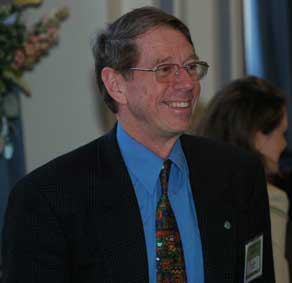
Speaking at the International Environment Forum conference in Ottawa in 2007
UNEP gave me a consultancy to review all national reporting on the state of the environment since 1992. They said it would be easy since all the reports were in a database, but when I looked there were only about 300 with many gaps. By the time I finished I had identified 1,800 reports and examined 1,200 of them in languages I could read. The result was a report I wrote for the 2008 UNEP Governing Council, Overview of environmental assessment landscape at national level: State of state-of-the-environment reporting, as well as contributions to a Governing Council document Overview of the international environmental assessment landscape and options for a future global assessment on environmental change.
I again organized the 2008 UNEP/University of Geneva/Graduate Institute Course in Environmental Diplomacy at the Chateau de Bossey, Switzerland, and gave an introductory lecture on Preventing Overshoot and Collapse: Managing the Earth's Resources. I was a speaker at the Freiburg Forum on Environmental Governance in Freiburg, Germany; an invited participant in a UNEP/SCOPE meeting on environmental measurement in Paris; participated in the advisory board meeting for a European project on indicators of sustainability in Tampere, Finland; presented a paper on Science and Religion in the Climate Change Debate: Case Study of the Baha'i Community at an International Conference on Ethics and Climate Change: Scenarios for Justice and Sustainability in Padua, Italy; participated in the International Human Rights Forum in Lucerne, Switzerland; and attended the International Coral Reef Symposium in Fort Lauderdale, Florida.

At the International Coral Reef Symposium in Fort Lauderdale, Florida, in 2008, I met two other members of the International Environment Forum, Elizabeth McLean from Puerto Rico and my old friend Austin Bowden-Kirby from Fiji
For our Bahá'í-inspired organizations, I spoke at an EBBF - European Baha'i Business Forum conference in Italy and joint EBBF/International Environment Forum Conference in the Netherlands on "Growth or Sustainability? - Defining, Measuring and Achieving Prosperity" where my topic was Introducing Solutions. I also addressed AIESEC conferences in Switzerland, Austria, Italy, and as a keynote speaker at the AIESEC International Presidents Meeting in Macedonia. I lectured at the Instituto Impressa Business School and EOI Business School of Computense University in Madrid; presented a keynote and paper on The ethical challenges of global change as a motivator for consumer citizenship at the Consumer Citizenship Network International Conference in Tallinn, Estonia; was a speaker and panelist in a keynote session on multiple dimensions of climate change at the Bahá'í Conference on Social and Economic Development in Orlando, Florida, mp3 audio recording, powerpoint presentation; and lectured at a Bahá'í Summer School in Portugal.
The Bahá'í Office of Public Information asked me to become involved with the European Center for Peace and Development (ECPD) of the UN University for Peace, in Belgrade, Serbia, beginning a long relationship with this organization working for tolerance and reconciliation in the Western Balkans. I was invited to speak on Environment as a Factor for Peace at the ECPD Conference on National Reconciliation, Inter-Ethnic and Inter-Confessional Tolerance in the Balkans: Reconciliation and Human Security, in Milocer, Montenegro. After the conference we were invited to meet with the Metropolitan heading the Orthodox Church in Montenegro in his monastery, who showed us his relics and complained about political interference in the church.
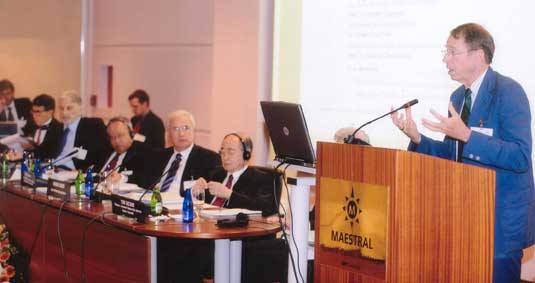 .
. 
At the 2008 Conference on Peace and Development in Montenegro, I spoke on the environment as a force for peace
I published a paper on Les problèmes de l'environnement et les solutions bahá'íes in La Pensée Bahá'íe, pour un développement vraiment durable; and updated and expanded for general use my 1985 Rural Environmental Management: A do-it-yourself course and training programme consisting of 48 units.
A significant research activity that started in 2009 was to develop indicators of intangible things like values. To change behaviour towards more sustainability requires changes in values, so it is important for educators to know if they have succeeded in motivating their students to apply their values in action. With a Bahá'í friend, Prof. Marie Harder at the University of Brighton, we designed a research project to develop values-based indicators of education for sustainable development and received two years of funding from the European Union. I therefore participated in a review panel and research team meetings for the project at the University of Brighton, England; chaired the first Core Group Meeting at Charles University in Prague, another project partner, and the second Core Group Meeting in Brighton, also speaking at a Barnett dignitaries meeting in London while I was there.
I was again the oordinator and lecturer at the UNEP/University of Geneva/Graduate Institute Certificate of Advanced Studies in Environmental Diplomacy in Geneva, where I presented the opening theme on the Financial Crisis and the Green Economy; I also lectured in the University of Geneva Certificate of Advanced Studies in Sustainable Development, and on sustainable development indicators at the University of Lausanne. I was an invited participant in a workshop on the Global Islands Database at the UNEP-World Conservation Monitoring Centre in Cambridge, UK, and a participant in an IUCN Regional Directors meeting on islands in Malaga, Spain. For EBBF I was a keynote and closing speaker at its Annual Conference in dePoort, the Netherlands; and a keynote speaker for AIESEC alumni at the AIESEC International Presidents Meeting in Rome, as well as at an AIESEC Sustainability Day in Vienna, Austria.
My annual collaboration with ECPD, the European Center for Peace and Development continued, speaking on Human Security and Climate Change: The Ethical Challenge at the ECPD Conference on National and Inter-ethnic Reconciliation, Religious Tolerance and Human Security in the Balkans on the Brioni Islands, Croatia. For IEF, I gave the opening keynote lecturer on Transforming Environments from the Inside Out and was a panelist at the Association for Baha'i Studies of North America, and International Environment Forum 13th Annual Conference in Washington, D.C.; and presented a paper on The financial crisis and consumer citizenship at the Sixth Consumer Citizenship Network Conference in Berlin.
Climate change was a major issue in 2009 in the lead up to the Climate Change Summit in November. In March, there was an International Science Congress on Climate Change: Global Risks, Challenges and Decisions, in Copenhagen, where I presented on The response to climate change from the Baha'i community. UNDP was afraid that the governments would fail to agree in Copenhagen (they were right) and so they invited all the world's religions to prepare action plans on climate change. The IEF was invited to work on an action plan for the Bahá'ís before it was decided that this should come from the Bahá'í International Community, I was one of the representatives to present our action plan on climate change to Prince Philip and UN Secretary-General Ban Ki-moon at the ARC/UNDP Celebration of the Faith Commitments for a Living Planet at Windsor Castle. I also represented the International Environment Forum and the Baha'i International Community at the UN Climate Change Conference (COP15) in Copenhagen in November, speaking in parallel NGO events and participating in a seminar on ethical dimensions of climate change. Apart from this, I gave Bahá'í-organized public lectures on ethics and climate change in Rouen and Caen, France, was the featured lecturer at the Danish Baha'i Summer School on Bornholm, Denmark, and taught at the Swiss Baha'i Winter School in Boldern, Switzerland. I also provided a chapter on Environment and Globalization for a textbook on Understanding the Global Environment.

Gathering of Religions for Climate Action Plans, Windsor Castle
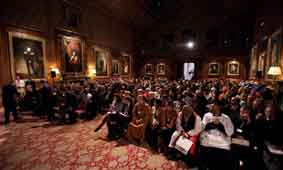 .
. 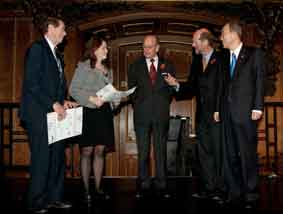 .
. 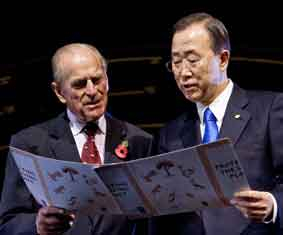
The formal gathering at Windsor Castle; presenting the Bahá'í Action Plan to Ban Ki-Moon and Prince Phillip; Prince Phillip and Ban Ki-Moon
In early 2010 I prepared a report for the International Environment Forum (IEF) on Climate Ethics and the Copenhagen Summit. Our work on the ESD indicators project continued with a third Core Group Meeting at Charles University in Prague, and a fourth in Brighton, leading to a Conference at the University of Brighton to present our results, co-organized by the ESDinds team and the IEF on "Making the Invisible Visible". I was named a Visiting Professor and gave my Inaugural Professorial Lecture on Life: A Systems Approach - Reflections on Multiple Dimensions of Sustainability during the conference. Some of the project results were published in a paper I co-authored on The Earth Charter and the ESDinds Initiative: Developing Indicators and Assessment Tools for Civil Society Organizations to Examine the Values Dimensions of Sustainability Projects. My long friendship with Bedrich Moldan, both working on indicators of sustainable development at the UN and with SCOPE, and then on values-based indicators, resulted in my being invited to Prague to present a paper on Bedrich Moldan and Indicators of Sustainable Development at an event and publication on "Deep ecological footprint: memories by friends and colleagues of Bedrich Moldan on the occasion of his 75th birthday". This work on indicators carried over into our collaboration with the Partnership for Education and research about Responsible Living (PERL) where I chaired a working group on values-based indicators at Joint Working Groups Meetings in Rome and Amsterdam. I also represented the IEF at the UN Human Rights Council Social Forum on Climate Change and Human Rights in Geneva, where I pointed out that most human rights violations in many countries were against migrants, which required more attention to educating the receiving communities.
Other university activities were lecturing in the University of Geneva Certificate of Advanced Studies in Sustainable Development, and coordinating a module and lecturing in the EPFL/Indian Institute of Science Certificate of Advanced Studies in Technology and Development in Bangalore and C.K.Pura, India, where we took the participants for two weeks to live with the villagers and work on problems useful to them, such as helping tribal herders to access veterinary advice over their phones on their migration, or addressing problems of irrigation pump maintenance that led to the government to start a pilot project there to replace all the pumps with more resistant models. I was again a session chair at the European Center for Peace and Development (ECPD) conference on National and Inter-ethnic Reconciliation, Religious Tolerance and Human Security in the Balkans: Human Security Concept Implementation, on the Brioni Islands in Croatia, where I spoke on Interstate Collaboration for Human Security: The Lessons From Copenhagen. I was also a speaker at EBBF conferences in Rome, and dePoort, the Netherlands, at an EBBF/AIESEC seminar at Acuto, Italy, and a panelist and workshop leader at the AIESEC National Conference in Fiesch, Switzerland.
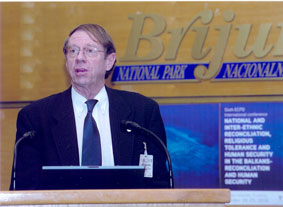 .
.  .
. 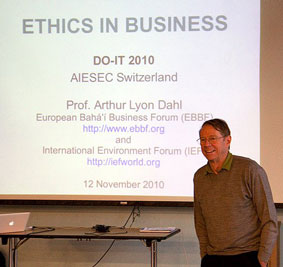
Speaking at the ECPD Conference in Croatia, and co-chairing a session; and at the AIESEC conference in Switzerland, 2010
The World Council of Churches organized a seminar in Geneva on "Human Rights? An approach to respond to the challenges of climate change", where I presented a paper on The Constraints of UNEP and International Environmental Law to Respond Effectively to the Victims of Climate Change. Finally, I published a paper on L'argent et la spiritualité : une perspective bahá'íe in La Pensée Bahá'íe.
With environmental governance going to be one of the main themes of the UN Conference on Sustainable Development in 2012, UNEP decided to invite all the major groups recognized by the UN to designate experts to serve on a UNEP Major Groups and Stakeholders Advisory Group on International Environmental Governance. I was appointed to the group and elected its co-coordinator We started our work with a teleconference with the UNEP Executive Director and the Ministers co-chairing the High Level Consultative Group on International Environmental Governance meeting in Helsinki, Finland. This became one of my major activities in 2011.
My work in 2011 as co-coordinator of the UNEP Major Groups and Stakeholders Advisory Expert Group on International Environmental Governance continued, co-chairing a meeting of the group; participating in a high-level panel on International Environmental Governance at the Major Groups and Stakeholders Forum; participating in a Ministerial Round-table; and acting as spokesperson for the group at the UNEP Governing Council/Global Ministerial Environment Forum in Nairobi, Kenya, for which I also prepared a document: Inputs from major groups and stakeholders on international environmental governance UNEP/GC.26/INF/19. I continued to represent the group at the Preparatory Committee for the UN Conference on Sustainable Development, as panelist in a high-level side event in New York, and in a UNEP Global Consultation in preparation for Rio+20, UNEP Regional Consultation for Europe, and UN Department of Public Information 64th NGO Conference in Bonn, Germany.
Apart from that, I lectured at an EBBF/AIESEC seminar in Acuto, Italy; was keynote speaker in a Values in Business Seminar, and for International Peace Day in Stroud, UK, and gave a seminar at the School of Engineering, University of Birmingham, UK. My presentation at the 7th ECPD International Conference on Reconciliation, Tolerance and Human Security in the Balkans in Milocer, Montenegro, was on European Union and Global Sustainability: Issues for Rio 2012.
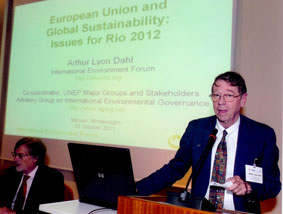 .
. 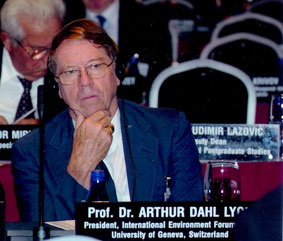 .
. 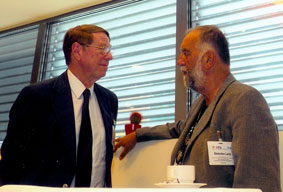
At the European Center for Peace and Development (ECPD) Conference in Montenegro in 2011
I was an invited participant in the World Science Forum in Budapest, Hungary, and gave a seminar at the Central European University; was invited to give a public lecture for the Institute of Swiss Studies at the University of Upper Alsace, Mulhouse, France; and another public lecture for the Nehal Foundation, and seminar on foreign policy in Madrid, Spain.
The work on values-based indicators continued through the Partnership on Education and research about Responsible Living (PERL) with Think Tank Meetings in London and at UNESCO in Paris, after which I presented papers on A Multi-level Framework to Enable Responsible Living and Values-based Indicators for Responsible Living at the PERL International Conference in Istanbul, Turkey, and lectured at universities in Istanbul and Ankara. I also co-organized and gave a public lecture and panel presentation at the 15th Annual Conference of the International Environment Forum in Hobart, Tasmania, Australia, with a VIDEO interview; lectured on the artist Mark Tobey at the Arts Faculty, University of Brighton; and lectured at the French Bahá'í Summer School. The Forum on Religion and Ecology at Yale University asked me to prepare the section of their website on the Bahá'í Faith and ecology: Bahá'í Faith (updated in 2020).
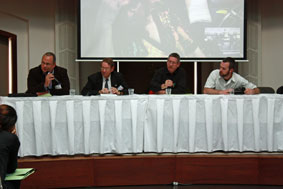
Panelist at the IEF Conference in Hobart, Tasmania, 2011
The highlight of 2012 was the United Nations Conference on Sustainable Development (Rio+20) in Rio de Janeiro, Brazil. The IEF was accredited as an observer organization to the conference, and our delegation organized and contributed to a number of side events and scientific forums, often in collaboration with the Bahá'í International Community. We made submissions to the bureau of the conference and on issues proposed by the host government. One of our proposals was picked out by UNDP in a separate box in their compilation of inputs, and another received so many votes that it was debated by a high-level panel at the conference, so we could see that even small organizations with good ideas could have an impact. In Rio, I presented a paper on Values education for sustainable consumption and production: from knowledge to action at the Global Research Forum on Sustainable Consumption and Production, on the theme: Global and Regional Research on Sustainable Consumption and Production: Achievements, Challenges, and Dialogues. This was also the 16th IEF Annual Conference, and I spoke on Changing Mentalities and Motivations: Values for the Sustainability Transition at our event at the Peoples' Summit in Rio de Janeiro.
Other important activities during the year were speaking for an International Youth Conference, a UNEP Regional Consultation with the government on planning integrated approaches to sustainability, and addressing the Diplomatic Academy during Green Week in Baku, Azerbaijan; and going again to a small village in rural India for two weeks as a member of the scientific committee and accompanying faculty for the EPFL Certificate of Advanced Studies in Management of Development Projects, working on rural development projects
PERL held its 2nd International Conference in Berlin, where I presented two papers on Alternatives to the Consumer Society, and on Enabling Action at Rio+20. There was also a Planet Under Pressure 2012 international scientific conference in London, where I presented four papers on Design Criteria and Learning Strategies for International Environmental Governance, Ethical Sustainability Footprint for Individual Motivation, Science, Governance and Ethics in Environmental Migration, and with Sylvia Karlsson-Vinkhuyzen Challenges in the Integration of Systems Knowledge for Governance of the Earth System. The European Center for Peace and Development (ECPD) made me a member of its Academic Council, as well as a speaker on Right of each human being to enjoy peace, security and welfare at its 8th International Conference on Reconciliation, Religious Tolerance and Human Security in the Balkans, in Belgrade, Serbia.
I was a workshop leader and closing keynote speaker on Critical decade for the transition to sustainability: crises and opportunities for redefining the enterprise at the EBBF annual conference on "Redefining the enterprise" in Ericeira, Portugal; led two workshops for EBBF at the AIESEC national conference in Leysan, Switzerland; was a panel participant on Excellence and holistic thinking at an EBBF learning event "Redefining excellence" in London; and a workshop leader at the AIESEC Do-It National Conference in Fiesch, Switzerland. Other events in Switzerland in which I participated were the Global Ethics Forum in Geneva, the Caux Forum on Human Security in Caux, and the Triglav Circle meeting in Les Charbonnières, Switzerland. I was then asked to join the Triglav Circle, formed by the Secretary-General of the 1995 Copenhagen Social Summit with leading theologians to consider issues values and spirituality that had not been well covered at the social summit, and have continued to participate in their meetings. I gave lectures for the Bahá'ís on sustainability and climate change in Auckland, New Zealand; participated in the Association for Baha'i Studies, North America, annual conference in Montreal, Canada; lectured at the Quebec Baha'i Summer School; joined the French Baha'i Summer School in Evian-les Bains; lectured at a Bahá'í Winter Camp in France; and co-organized and lectured at the Swiss Baha'i Winter School in Einsiedeln.
Other publications in 2012 included an Editorial with Tomas Hak and Bedrich Moldan in Ecological Indicators along with a major paper on Achievements and gaps in indicators for sustainability; The Earth Charter included my chapter on Dialogues between Faith Values and Education for Sustainable Development Values - The Bahá’í Faith in its book Exploring Synergies between Faith Values and Education for Sustainable Development; and I wrote a paper on Human Development: A Vision of Well-being.
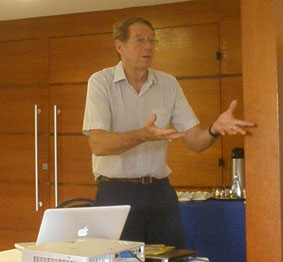
Speaker at IEF event at Rio+20, Rio de Janeiro, 2012
My activities in 2013 covered a range of subjects. The World Bank brought me in as a consultant to design a business environment for energy index; UNEP invited me as an expert in its Foresight Workshop on Small Island Developing States at Cambridge University, England; I was an invited expert at the ASEM (Asia Europe Meeting) Seminar on Environment and Human Rights in Copenhagen; for the Third Rencontres Internationales de Reims on Sustainability Studies at the University of Reims, France, I presented Putting the Individual at the Centre of Development: Indicators of Well-being for a New Social Contract, drawing on my research for the World Bank on a new index of development looking at the human being rather than economic statistics. This was then published as chapter 8 in a book on Transitions to Sustainability. I chaired a workgroup at the PERL Workgroups meeting in Marseilles; and presented a paper at a seminar on challenges for islands at IRD, the French Research for Development Institute in Montpellier.
On the teaching side, I was on the scientific committee and a lecturer at the University of Geneva Certificate of Advanced Studies in Sustainable Development; designed and taught a module on sustainable development in the EPFL Certificate of Advanced Studies in Management of Development Projects; lectured on biodiversity conservation at the University of Geneva; and for the Duke University Summer Program in Geneva; organized a module on the science-policy interface at the University of Geneva Global Environmental Policy Programme Summer School; and was lead faculty in designing an on-line course on sustainable development for the Wilmette Institute which we now teach every year.
I gave the opening keynote on What is Sustainable Wealth? at the 17th IEF International Conference, and ebbf - European Bahá'í Business Forum joint conference in Barcelona, led a workshop at the EBBF spring meeting in London; lectured for an AIESEC workshop at the University of Bern; led workshops at the AIESEC national conference in Fiesch, Switzerland; and participated in the World Forum for Ethics in Business in Geneva. For ECPD I presented a paper on New Balkans Sustainability and the Post-2105 Development Agenda at the Ninth European Centre for Peace and Development annual conference in Belgrade, Serbia. A most interesting meeting was the Centre for Social Pediatrics/Club of Rome Symposium on Meaning, Values and Spirituality in the Development of Children and Young People in Winterthur, Switzerland, on which I prepared a detailed report. For the Bahá'ís, I gave 9 lectures on sustainability and the environment in 6 days in Nässjö, Linköping, Sollentuna, Stockholm and Uppsala, Sweden; lectured at the National Bahá'í Centre in Luxembourg on "The Bahá'í Faith: an Ecological Religion", Le défi de l'écologie : Le point de vue de la foi baha'ie and on "Baha'i Principles of Governance", Les Principes de Gouvernance du point de vue baha'i part 1 and Les Principes de Gouvernance du point de vue baha'i part 2 (in French); lectured at a Baha'i Winter Camp in France; and was co-organizer of the Swiss Bahá'í Winter School at Einsiedeln.
My publications included the Preface to Biodiversity and Societies in the Pacific Islands; A Multi-Level Framework and Values-Based Indicators to Enable Responsible Living in the book Enabling Responsible Living; and co-authoring Substratum stability and coral reef resilience: insights from 90 years of disturbances on a reef in American Samoa in Micronesica, which updated the work I did setting up long-term coral reef monitoring forty years before.
In 2014, I was a member of UNEP drafting groups that prepared Emerging Issues for Small Island Developing States and GEO Small Island Developing States Outlook, as well as a consultant to UNEP to prepare an analysis for the UNEP Regional Office for Europe (UNEP/ROE) and the proposed Sustainable Development Goals (SDGs): Analytical report on regional implications and perspectives of the proposed SDGs as they relate to the UNEP ROE PoW identifying areas of alignment. I also prepared a background document for the World Bank Group on an inventory of all national legislation discriminating on the basis of race, ethnicity, religion or sexual orientation, and anti-discrimination measures.
My educational activities included coordinating a module on the science-policy interface at the University of Geneva Global Environmental Policy Programme Executive Summer School; spending two weeks in India, mostly in a remote rural village, as accompanying faculty for the EPFL course on Management of Development Projects; teaching in three modules of the University of Geneva Certificate of Advanced Studies in Sustainable Development; serving as faculty for two Wilmette Institute on-line courses on climate change; and chairing a workgroup on values-based education toolkits at the Partnership for Education and Research about Responsible Living (PERL) Workgroups meeting in Sligo, Ireland, leading to the publication of three PERL Values-Based Learning Toolkits on Measuring What Matters: Values-Based Indicators: A Methods Sourcebook; Discovering What Matters: A Journey of Thinking and Feeling: Activities Developed with Students, for Students; and Growing a Shared Vision: A Toolkit for Schools: Activities for Organisational and Staff Development.
I lectured at Fudan and Dong Hua Universities and presented a paper on The Ethics of Hope: Values as Positive Drivers for a Sustainable Future at the Second Global Research Forum on Sustainable Production and Consumption in Shanghai, China; lectured on sustainable development for an International Committee of the Red Cross training course; gave seminar on sustainability governance at Wageningen University; presented a paper on Ideas on Harmony with Nature as a member of the Triglav Circle meeting in Neuchatel, Switzerland; and spoke on Hope for Balkan Youth in the Contemporary World Reality for Youth Forum at the ECPD International Conference on Reconciliation, Tolerance and Human Security in the Balkans in Belgrade, Serbia.
For Bahá'í-inspired organizations, I gave an opening keynote on Holistic Justice: Coherence and Service in our Economic Life at the European Bahá'í Conference on Justice in de Poort, Netherlands; lectured on Healing Our Relationship with Nature at the International Peace Seminar in Walenstadt, Switzerland; was a plenary panelist on Natural Sciences and Society, a keynote lecturer on Addressing Sustainability Challenges: A Framework for Material and Spiritual Transformation, a panelist on Introducing Bahá'í Principles to United Nations Dialogues and Conferences, and a workshop facilitator at the International Environment Forum/Association for Bahá'í Studies - North America joint annual conference in Toronto, Canada; participated as Chairman of the Board in the in ebbf - Ethical Business Building the Future spring event in London; gave the closing keynote at an Ethics Expo in Mantua, Italy; and was the public lecturer, and a discussion facilitator at the ebbf Annual Conference in Barcelona, Spain. For the Bahá'ís, I recorded Spiritual Responses to Climate Change with Elizabeth Bowen for the United States Baha'i Community; gave public lectures on climate change in Ennis, Limerick and Dublin, Ireland; lectures on ecology and climate change at the Russian Lyceum and American College in Sofia, Bulgaria; a talk on science and religion in Amsterdam, the Netherlands; a lecture on women in ecology at a Bahá'í Spring Camp in France; and co-organized and taught at the Swiss Bahá'í Winter School in Einsiedeln. In addition to those mentioned above, my publications included a chapter on Agenda 21 in a Handbook of Global Environmental Change, and another chapter on Sustainability and Values Assessment in Higher Education in a book on Sustainable Development and Quality Assurance in Higher Education: Transformation of Learning and Society.
2015 got off to a good start as I prepared and presented a module on the special problems of Small Island Developing States for a UNEP/University of Geneva MOOC (Massive Open Online Course) on "Climate Change Adaptation in Small Island Developing States" on Coursera with 8,000 participants. I also lectured on environmental ethics and was a panelist in a Policy Dialogue on Implementing the Sustainable Development Goals (from 55:15, 16 min) for the University of Geneva Global Environmental Policy Programme. The World Bank gave me a consultancy to develop a proposal on how it could measure all the dimensions that are important to people for Living their Life. I lectured in Madrid at the EOI Business School on "40 Years of International Sustainability Governance". UNEP asked me to speak on Resource efficiency improvements and marine resources management in the Sustainable Development Goals (SDGs) at the UNEP International Resource Panel Scoping Workshop on Marine Resources in Paris, and to facilitate a UNEP national workshop on integration of the Sustainable Development Goals in Baku, Azerbaijan. I spoke on Europe and the 2030 Agenda: Regional Assessment at the European Economic and Social Committee/UNEP/European Environment Bureau Conference on the Sustainable Development Goals: Implementation in Europe, and UNEP Regional Consultation for the United Nations Environment Assembly: Opportunities for Engagement of Major Groups and Stakeholders, in Brussels, Belgium. I was coordinating lead author for Chapter 1.1 and a lead author for Chapter 4 of the UNEP Global Environment Outlook 6 GEO-6 Assessment for the pan-European region and participated in the UNEP GEO6 book sprint in Nairobi, Kenya.
On the research side, I took part in the Global Research Forum on Sustainable Production and Consumption, and Partnership on Education and Research for Sustainable Living (PERL) consultations in Vienna, Austria, and research consultations and strategic planning at Fudan University in Shanghai, China. I was an expert adviser to the International Resource Panel meeting, and participant in the World Resources Forum in Davos, Switzerland, as well as an International Forum on Public-Private Partnerships in Annemasse, France. For the European Center for Peace and Development (ECPD) annual conference in Belgrade, Serbia, I spoke on The Sustainable Development Goals and their implications for the Western Balkans.
A major event of the year was participating in the UN Climate Change Conference (COP21) in Paris, organizing and speaking in three International Environment Forum events on community resilience, accountability, and education in the Climate Generations area and another sice event on accountability in the Dutch Pavilion, as an accredited observer for the Baha'i Community. This included my presentation on Personal and professional accountability: an ethical challenge in our side event on "Principles of Accountability for Climate Change Agreements" with a video at https://vimeo.com/152637286. I also represented IEF as an associated partner in the Global Ethics Forum in Geneva, and co-organized and spoke on A Multi-level Approach to Ethics, Service and Responsible Living at the International Environment Forum Symposium and Partnership for Education and research about Responsible Living (PERL) International Conference at UNESCO in Paris. I was a facilitator at the ebbf - Ethical Business Building the Future spring event near Lisbon, Portugal, and a keynote speaker on The science and spirituality of unity and collaboration at the ebbf 25th annual conference in Barcelona, Spain. See commemorative video at https://vimeo.com/142291557. The Bahá'í World Centre wanted to learn from the experience of our two Bahá'í-inspired professional organizations and invited me to Haifa, Israel, for consultations. I gave a seminar for senior staff, and met with the external affairs policy committee and different relevant offices, as well as trying to capture our experience in a report.
Other Bahá'í activities included serving as faculty for the Wilmette Institute on-line course on "Scientific and Spiritual Dimensions of Climate Change"; giving a Wilmette Institute web talk Navigating the Storm: The Transition to Sustainability; giving a keynote lecture at the International Justice Conference in de Poort, The Netherlands, on "Justice and Global Policy Change for Environmental Stewardship"; participating in a La Garde Spiritual Week on nature and spirituality at the Domaine de la Garde near Bourg-en-Bresse, France; lectures in Madrid at the Nehal Foundation and the Baha'i National Centre on "Ecological and Economic Principles for a New World Order"; on climate change in Frankfurt, Germany; on environment and public discourse at the German Baha'i Summer School; on "Unité écologique et spirituelle" and "La Justice économique" at a French Baha'i Winter Camp; in Chambery, France, on "Retrouver la confiance face à la crise"; and serving on the organizing committee for the Swiss Baha'i Winter School in Laysin.
Among my publications were two chapters for a book on Responsible Living: Concepts, Education and Future Perspectives, one on Ethics in Sustainability Education, and another co-authored on Making the Invisible Visible: Designing Values-Based Indicators and Tools for Identifying and Closing ‘Value-Action Gaps'. I also prepared a Summary and Commentary on Laudato Si: the Pope's encyclical on the environment and poverty for the International Environment Forum; and had a letter published in New Scientist on Werewolf seaweed of old acquaintance about how the seaweed I worked on as a graduate student used moonlight to synchronize its reproduction. UNEP published a book Setting a Course for Regional Seas in which I wrote a section on SPREP: Primed for Action" and three quotes in boxes.
For the United Nations Environment Programme in 2016, I was asked for a paper on education, resulting in Values-based education for environment and sustainable development; and was part of a UNEP Expert Group on Guidelines for Integrated Environmental Assessment that met at GRID Arendal, Norway. I participated in a Geneva Engage conference on e-diplomacy. For the AIESEC Global Leaders Summit in Marrakech, Morocco, I moderated an external panel for the International Presidents Meeting, and gave the opening keynote at its YouthSpeak Forum on Sustainable Development Goals.
For our Bahá'í-inspired organizations, the International Environment Forum (IEF) held its annual Conference at Nur University in Santa Cruz de la Sierra, Bolivia, on the theme "Implementing the Sustainable Development Goals at Individual and Community Levels", where I gave a keynote on Looking at the Sustainable Development Goals from the Bottom Up; I spoke on Using the new UN 2030 Agenda to work for justice at the local level at the Justice Conference in de Poort, The Netherlands, on the theme "Justice In Action: From Local to Global", also lecturing at Wageningen University on "Is science enough?", giving a seminar on UNEP work on coral reef management, plus lectures in Helsum and Amsterdam; ebbf - Ethical Business Building the Future held its spring event in Milan, Italy; the Vision Gulf Business Conference in Kuwait invited me to speak on The Future of Business in a World with a Changing Climate, and The 2030 Agenda and the Sustainable Development Goals: Challenges and Opportunities for Business; I spoke on The 2030 Agenda and Sustainable Development Goals: Placing Environmental Health in a Larger Ethical Framework at Third International Symposium on Ethics and Environmental Health in Ceske Budejovice, Czech Republic; for the European Center for Peace and Development (ECPD) conference in Belgrade, I spoke on Implementing the UN Sustainable Development Goals in the Balkans.
I was lead faculty for the Wilmette Institute on-line course on Sustainable Development and the Prosperity of Humankind; a faculty member for the Wilmette Institute on-line course on Climate Change; lectured for the Duke University Summer Session in Geneva on "The ethics of sustainable development"; participated in a retreat on everyday spirituality in La Garde near Bourg-en-Bresse, France; spoke at the Baha'i Summer School in Angers, France; lectured on the artist Mark Tobey at a Baha'i autumn camp at La Chapelle d'Abondance, France; and tutored a class at the Baha'i Winter School at Chavannes de Bogis, Switzerland. Finally, I attended the dedication of the Baha'i House of Worship for South America in Santiago, Chile, representing the Swiss Baha'i Community.
Among my publications were Input to the United Nations 2016 Virtual Dialogue on Harmony with Nature – Earth Jurisprudence – Theology/Spirituality; a chapter with Peter Adriance on Baha'i in the Routledge Handbook of Religion and Ecology; an article La relation à la nature dans la foi Baha'ie in Présence Choisis la vie! Approche spirituelle de l’écologie; another article on Environment and Sustainability in the Middle East for the Burhán Institute, later published in the book Winds of Change; and a blog Corruption, Morality and Religion on the International Environment Forum website, revised and issued in three parts on http://bahaiteachings.org: Part 1: The Moral Force Which Sustains Society: Gravely Depleted, Part 2: The Role of Religion in an Ethical Society, and Part 3: Exorcising Religious Bigotry and Superstition.
I participated in a 2017 Consultation Meeting on the UN Environment Strategy for Engagement with Faith-Based Organizations in Nairobi, Kenya, and was requested to prepare a UN Environment Perspective on Why should the UN and in particular UN Environment Engage More with Faith-based Organizations?. I orrganized and was a panelist speaking on The Systems Science of Disintegration and Integration at the International Environment Forum Annual Conference with The Justice Conference 2017 on the theme From Disintegration to Integration: Navigating the Forces of Our Time at de Poort, The Netherlands, and lectured at Wageningen University; was the opening keynote speaker on Systems Science Beyond Diversity VIDEO for the ebbf - Ethical Business Building the Future annual conference on Beyond Diversity in Geneva; participated in ebbf Governing Board meeting and conference in Bucharest, Romania; and in the Partnership for Education and Research about Responsible Living (PERL) Thinktank on Future Priorities at UNESCO in Paris; was a speaker on UN Charter revision as the foundation for peace, a session chair and rapporteur for the European Center on Peace and Development (ECPD) International Round Table on "Peace and Democratic Multilateralism" and youth session in Belgrade, Serbia; was an invited keynote speaker on "Sustainability Challenges for Research and Education" at the 25th anniversary celebration for the Charles University Environment Center in Prague, Czech Republic; took part in the Triglav Circle meeting in France; participated in the annual retreat at the Domaine de La Garde near Bourg-en-Bresse, France on the theme of art and spirituality, speaking on Mark Tobey; was faculty again for the Wilmette Institute on-line courses on Agriculture, Climate Change, and Sustainable Development; and an instructor at the Swiss Baha'i Winter School in Leysin.
My publications included: Island Conservation Issues in International Conventions and Agreements in Environmental Conservation theme issue on Humans and Island Environments; co-authoring a paper on Entry into Force and Then? The Paris Agreement and State Accountability in Climate Policy; and a four-part series at bahaiteachings.org on Science and Religion in the Climate Change Debate: 1) Ethics and Climate Change: Scenarios for Justice and Sustainability, 2) The Baha'i Call for Religion and Science to Unite, 3) The Revolutionary Bahá'í Approach to Climate Change, and 4) One Global NGO that Unites Science and Spirituality. I also made a one hour Bahá'í podcast on My life as a Bahá'í scientist.
My professional interests and opportunities for service took a whole new direction in 2018 when, with Augusto Lopez-Claros and Maja Groff, we responded to the announcement by the Global Challenges Foundation of a $5 million New Shape Prize for the best proposals to address global catastrophic risks through strengthened global governance. When we heard that there were 14,000 expressions of interest and over 2,700 applications accepted, including our proposal Global Governance and the Emergence of Global Institutions for the 21st Century, we gave up and decided to write a book instead. Much to our surprise, we were invited at the end of May as a finalist to the New Shape Forum in Stockholm opened by the Director-General of the UN in Geneva and with leading scientists and the Swedish Minister of Foreign Affairs as speakers, and on the last evening we were announced as the first of three winners (Summary proposal). This led to a Global Challenges Foundation working group meeting in Hamburg, Germany; speaking at a high-level briefing on Global Governance and the Emergence of Global Institutions for the 21st Century. at the UN Office of the Bahá'í International Community in New York; participating in the Paris Peace Forum, in a working group meeting on Global Governance for the 21st Century, and as a panelist at Sciences Po (University of Political Science) in Paris; and again at the Center for Strategic and International Studies in Washington, D.C.; as well as at Wageningen University on "Governance and the SDGs".
Apart from governance, the International Environment Forum used its participation in the UN High Level Political Forum on Sustainable Development in New York as its annual conference, organizing a virtual panel of video clips by its members that could be viewed on smartphones that were seen by many times the number of people as would have attended a meeting, where I spoke on Transformation towards sustainable and resilient societies FULL TEXT and Responsible consumption and production FULL TEXT, as well as a side event where I also spoke; another IEF member and myself also were among the few experts included in the Talanoa Dialogue under the UN Framework Convention on Climate Change in Bonn, Germany; I took part in the UN Economic Commission for Europe Regional Forum on Sustainable Development in Geneva; lectured in the University of Geneva Certificate of Advanced Studies in Sustainable Development; and spoke at the University of Geneva's Sustainability Week.
Another activity was a TED X talk I gave (in French) at INPENSEEIHT, University of Toulouse, France on the subject of intellectual property being captured for private profit, visible on YouTube at Information: propriété prive ou bien commun (Information: Private Property or Public Good); also published in two parts on BahaiTeachings.org as Information: Private Property or Public Good and How the Information Age Affects Our Food. I was a keynote speaker at 7th International Conference on Environmental Future, Humans and Island Environments, in Honolulu, Hawaii; also at the ebbf - Ethical Business Building the Future annual conference at Chavannes de Bogis, Switzerland, on Governance and the Sustainable Development Goals, and an ebbf retreat in Acuto, Italy, and for an ebbf webinar on What new forms of governance are the SDGs enabling?. For the European Center on Peace and Development, University for Peace chartered by the United Nations, International Conference in Belgrade, Serbia, on "A New Concept of Human Security", I prepared the concept note, served as rapporteur and speaker on Integration through shared values, and chaired and spoke at the following Youth Forum. I was a panelist on Migration and Religion at the World Conference on “Religions, Creeds and Value Systems: Joining Forces to Enhance Equal Citizenship Rights” at the Palais des Nations in Geneva; spoke on Reflections on Science, Technology and the Human Spirit at the Triglav Circle 2018 at the Chateau de Poussignol, Blismes, France; participated in the retreat on Everyday Spirituality and our Economic Bahaviour at the Domaine de la Garde, France, speaking on Rethinking business and the economy based on spiritual principles; spoke at the Justice Conference 2018: Shining a Light of Illumination in Turbulent and Divided Times, at de Poort in the Netherlands, on The Great Dichotomy: from Egoism to Altruism; from Love of Power to Love of Justice VIDEO; was keynote speaker at an International Conference on Spiritually-based Management Models in Athens, Greece; at the Baha'i Autumn Camp in La Chapelle d'Abondance, France, and at the National Baha'i Centre in Paris; and finally gave a keynote on Integration in a World Community at the All Party Parliamentary Group on Baha’i Faith Luncheon at the Houses of Parliament, Westminster, London, England.
This was also a busy year for publications. I was commissioned to write two chapters for the Routledge Handbook of Sustainability Indicators, one Contributions to the Evolving Theory and Practice of Indicators of Sustainability looking at the theoretical challenges, and the other, UNEP and the CSD Process for Sustainable Development Indicators, describing the history of the development of indicators at the UN. With my friends at Charles University, we published Closing the Sustainability Gap: : 30 years after “Our Common Future”, society lacks meaningful stories and relevant indicators to make the right decisions and build public support in Ecological Indicators. My good friend Christian Depraetere and I wrote a chapter on Island Locations and Classifications for the Routledge International Handbook of Island Studies: A World of Islands. I was co-author on a paper The emerging accountability regimes for the Sustainable Development Goals and policy integration: Friend or foe? in Environment and Planning C: Politics and Space special issue on Integrative Governance. I also found time to write book reviews Man of the Trees reviewing Paul Hanley's Man of the Trees: Richard St. Barbe Baker, the first global conservationist, and Capitalism, Short-termism, Population and the Destruction of the Planet about Come On! Capitalism, Short-termism, Population and the Destruction of the Planet: A Report to the Club of Rome.
Much of my time in 2019 was spent completing our book on global governance (published in January 2020), but also presenting on global governance to a review panel of the Global Challenges Foundation in Stockholm, and making another presentation to the GCF later in the year as the basis for further funding of our work. I was also the opening speaker at the Model United Nations at the University of Dijon, France; and a speaker at the Common Home of Humanity, another organization working for governance of the global commons, in Porto, Portugal. I took part in the UN Economic Commission for Europe Regional Forum on Sustainable Development in Geneva; lectured on human rights and the environment at Sciences Po in Paris, for the Certificate of Advanced Studies in Sustainable Development at the University of Geneva, and for the Masters in Applied Environmental Science of the Baha'i Institute of Higher Education, online in Iran.
The International Environment Forum was invited to partner with the World Conference on Health Promotion in Rotorua, New Zealand, as its annual conference, where I was a sub-plenary speaker, and also lectured at Auckland University of Technology and two Baha'i Centres, and had a radio interview Saving the World's Coral on Radio New Zealand in Auckland. I was a plenary and workshop speaker at the Justice Conference in de Poort, the Netherlands, gave lectures and a workshop at Wageningen University and in Amsterdam; was a speaker at the ebbf - Ethical Business Building the Future annual conference in Chavannes-de-Bogis, Switzerland, spoke on Building a movement for global governance at an ebbf meaningful breakfast in Geneva, took part in an ebbf impact retreat in Acuto, Italy, and gave an ebbf online dialogue on Rethinking Success: What key dimensions of success are we failing to address?.
Another major activity was travel-teaching for the Bahá'ís, with a three week lecture tour of Scotland involving 24 talks in 22 communities from Dumfries to the Shetlands and from Isle of Skye to Aberdeen, for example speaking on Sustainability and Islands: the Challenges of the 21st Century at Lerwick Town Hall, Shetland Islands, and including a presentation for the Time for Reflection at the opening of the Scottish Parliament described in the Official Report and recorded on VIDEO. Another trip was to Malta for lectures at the University of Malta and the Malta College of Arts, Sciences and Technology, television (starting at 51:50) and press interviews, and a keynote talk at the Malta Roundtable for Wellbeing of Society. I was even asked to contribute text to a book Oliver Friggieri, Sketches and Poems. Little did I know then how travel would be shut down the next year by the pandemic.,,
This was also the year of Greta Thunberg mobilizing youth to strike and march for climate action. I joined more than 5,000 for the Spring march in Geneva, wearing a sign "old people support the youth", and again marched in the Swiss capital Bern in September, when a hundred thousand people, more than 10% of the whole Swiss population, descended on the Federal Parliament.
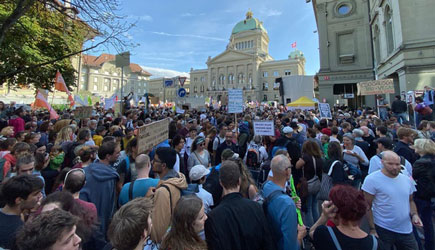 .
. 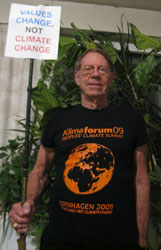 .
. 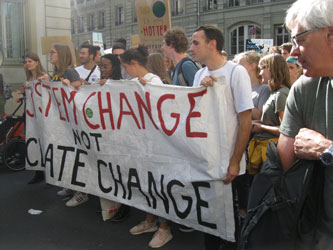
March on Bern, the Swiss capital
I also supported the scientific work at a National Climate Change Symposium in Bern. Looking at the risks of collapse in our global system more broadly, I was invited by a group of leading systems thinkers to take part in a colloquium in Stockholm on Complex Systems Science and Global Challenges with a VIDEO report (35 minutes with me at 12-13 minutes and 33-34 minutes (conclusion). What really made me feel old was to become the subject of research on the history of environmental action in the Pacific Islands for a doctoral dissertation by a Rhodes Scholar at Oxford University. For the European Center for Peace and Development (ECPD) 15th annual conference on "The UN Agenda 2030: To Transform the World" in Belgrade, I again prepared the concept note, gave an opening keynote on The UN 2030 Agenda to Transform the World: Where are we now?, was rapporteur, and chaired the following two-day Youth Forum. I was also named a Visiting Professor at ECPD.
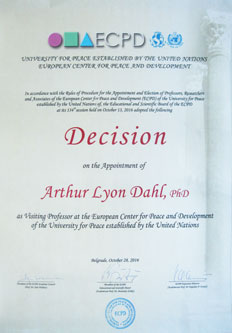 .
. 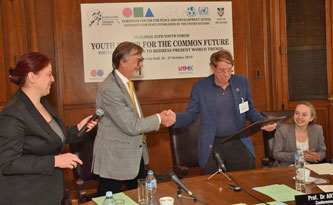 .
. 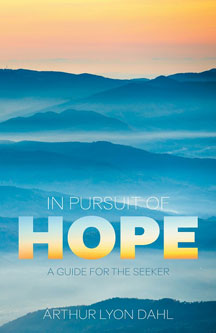
Other activities were the Triglav Circle meeting in the Chateau d'Ettevaux, France; a retreat on everyday spirituality and food at the Domaine de la Garde, France; a seminar of the International Academy for Human Sciences and Culture in Walenstadt, Switzerland; the Paris Peace Forum and a public talk at a Baha'i Exposition in Paris; lecturing at the Belgian Baha'i Summer School in Durbuy; the French Baha'i Summer School in Angers; and the Baha'i Winter School in Leysin, Switzerland.
My major publication in 2019 was my latest book In Pursuit of Hope: A Guide for the Seeker. A summary was published online in BAHAITEACHINGS.ORG, Introduction: Despite Disintegration: How a Natural Scientist Keeps Hope Alive, Part 1: Science and Religion: A User's Brief Guide to Life, Part 2: 7 Steps Toward Hope on Your Journey to Change the World, Part 3: An Activist's First Step: Stop Passively Consuming Material Goods, Part 4: Overshoot and Collapse: Have we Hit our Planet's Limits?, Part 5: Creating Social Justice in Your Own Community, Part 6: Debunking the Fairy Tales of Eternal Economic Growth, Part 7: How We Can Build a Green Global Economy, Part 8: Creating the Ultimate Social Change: Inside Ourselves, Part 9: Looking at Humanity through a Scientific Lens. My chapter Environment and Sustainability in the Middle East was published in English in the book Winds of Change: The Challenge of Modernity in the Middle East and North Africa. Several of my articles were placed on the International Environment Forum website, including Human Rights and Environment, Science and Global Governance, and The Climate Crisis and Global Governance, and an interview for ebbf Rethinking Success: What key dimensions of success are we failing to address? also on YouTube.
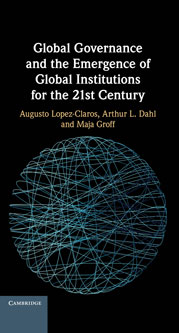 .
. The first big event of 2020 was the publication in January of our 545 page book written with Augusto Lopez-Claros and Maja Groff, Global Governance and the Emergence of Global Institutions for the 21st Century by Cambridge University Press and available on line or on order from Cambridge. We also organized a Global Governance Forum, and had a first Advisory Board meeting in Madrid. Promotion of the book followed with an ebbf webinar with Maja Groff on What is the role of global governance during a pandemic?, a Wilmette Institute webinar with Augusto Lopez-Claros and Maja Groff on Global Governance and the Emergence of Global Institutions for the 21st Century, and a guest blog for Felix Dodds The urgent need to reform global governance. The year also began with my involvement in two research projects: the Transformation of Education for Sustainable Futures project based at the University of Bristol, UK, https://tesf.network/, a £2.5 million effort to transform education in India, Rwanda, Somalia and South Africa, where I attended an Advisory Group meeting and project launch in January. The second project led by my friend Sylvia Karlsson-Vinkhuyzen, Make Visible: indigenous values for biodiversity, started in February with a workshop at Wageningen University, The Netherlands.
The COVID-19 pandemic and shutdown suddenly changed everything, with travel no longer a realistic possibility, so activities had to go online. My IEF blog in mid-March Does the Pandemic have a Silver Lining? was published by Other News: Voices Against the Tide on 23 March 2020 Does the pandemic have a silver lining and revised for BahaiTeachings.org as Could the pandemic have a silver lining?. Another IEF blog on the First Earth Day 1970 was revised for BahaiTeachings.org as Reflections on Earth Day, a half century of environmental action. The International Environment Forum moved its 24th Annual Conference online in partnership with the Bahá'í Academy in Panchgani, India, on the theme Education for Social Cohesion with a thousand participants, where I spoke on Inclusive Development and its Spiritual Indicators also on YouTube from 3:07:20 to 3:21:15. The ebbf conference on "Rethinking Success: a Way to Save the Planet and Ourselves" also went virtual, where I gave the opening keynote on Unity: Indicator of True Success VIDEO (starts at 21:15), keynotes on Rethinking what will create successful Global Governance VIDEO (1:05:00, starts at 7:30), and was on an evening open panelist. I also spoke for an ebbf meaningful morning in Utrecht, and gave an ebbf webinar on In Pursuit of Hope in a Time of Crisis. For World Environment Day on 5 June, I was interviewed live on Malta television. Other online activities included serving as faculty again for the Wilmette Institute course on climate change; giving webinars for the Baha'is of France on Un tournant dans la grande transition ? (in French), for the Baha'is of Luxembourg on "La crise sanitaire, une opportunité écologique", for Augusto Lopez-Claros in Washington, D.C. on "COVID, Climate, Collapse: Is there any Hope?", for the Justice Conference on Turning Point in the Transition, for the O.Z. Whitehead fireside in England on The pandemic as an environmental turning point, and an interview on Baha'i Blog In Pursuit of Hope: A Book by Arthur Lyon Dahl. Before the lockdown, I lectured in Thonon-les-Bains, France, for World Religion Day, on "Lier la spiritualité et les objectifs de développement durable". The Great Transition Initiative published my paper A Jolt in Consciousness, a contribution to the forum: "After the Pandemic: Which Future?", also as a pdf.
I prepared an essay for the Global Governance Forum on Why Education is Key for the Sustainable Development Goals, on Global Governance Forum Website, 19 January 2021. From January to March I was faculty for a Wilmette Institute online course on Agriculture. On 23 January, the Triglav Circle held an online consultation on the common good and social justice, where I presented a paper on "Global common good, global governance and global material and spiritual transformation". I shall be accompanying the ECPD Youth Forum Network all through the year, up to the next Youth Forum in October. My continuing collaboration with the Oxford Rhodes Scholar researching the origins of environmental thinking and action in the Pacific Islands continues to bring back memories. He photographed 14,000 pages of my Pacific archives that I gave to SPREP in Samoa. To support his work, I have scanned my slides from my years there starting with Samoa, and and created a web page Pacific Islands in the 1970s. I prepared a commentary on "The Economics of Biodiversity: The Dasgupta Review" published by the UK Government on 2 February 2021, The Dasgupta Review in a Bahá’í perspective. The Science Alliance for Valuing the Environment (SAVE), Ohio, USA, asked me to give a webinar on United Nations Sustainable Development Goals: A Blueprint to Achieve a Better and More Sustainable World. My book review Inside UNEP about Maria Ivanova's The Untold Story of the World’s Leading Environmental Institution: UNEP at Fifty, was posted on the IEF website. With my good friend Virginie Tilot, I was a co-author on a research paper Traditional dimensions of seabed resource management in the context of Deep Sea Mining in the Pacific: Learning from the socio-ecological interconnectivity between island communities and the ocean realm published in Frontiers in Marine Science, section Marine Affairs and Policy, 8:637938. doi:10.3389/fmars.2021.637938. I submitted Educating for the Future We Want as a contribution to the Great Transition Network discussing "The Pedagogy of Transition: Educating for the Future We Want" on 29 March 2021.
In October I participated in the New Shape Forum of the Global Challenges Foundation, presenting our Global Catastrophic Risk Index and our proposals for a Global Environment Agency.
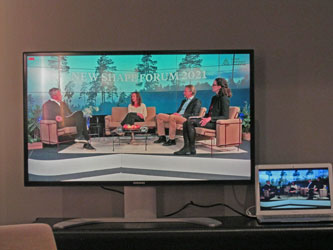 .
. 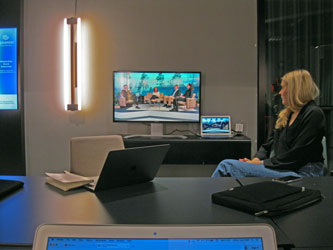
In the studio for the New Shape Forum
The paper I wrote with Sylvia Karlsson-Vinkhuyzen on Towards a Global Environment Agency for the Climate Governance Commission was published on 6 November. After some deep reflection on what was fundamentally wrong with our global system, I imagined a new concept of global systems accounting using other “currencies” then money, such as the carbon cycle for climate change, and other accounts for important dimensions of sustainability, that could create negative incentives for increasing debt and encouragement for more sustainable alternatives. This started as a simple blog and grew into a paper on Global Systems Accounting Beyond Economics. The UN Environment Management Group (EMG), that coordinates the whole UN system and has its secretariat near me in Geneva, invited me to keynote in its Stockholm+50: 2-part Roundtable Nexus Dialogue, with the first part Taking Stock of Our Responsibility and Opportunity on 23 November, and the second on Foreseeing the Future of our Responsibility and Opportunity, where I spoke, on 30 November.
The leading Swedish nature magazine Sveriges Natur interviewed me for a feature profile From Stockholm and Back, as a veteran of the 1972 Stockholm Conference on the Human Environment, for their April issue before the Stockholm+50 international meeting in June. As an advisor to the UN Environment Management Group on the UN system report to Stockholm+50, I was able to contribute some inputs to the official report. My paper "Filling a Critical Gap in Global Environmental Governance" was published on the IEF website and by the Global Governance Forum. My blog on Challenging Economic Assumptions Driving Climate Change for the Global Governance Forum was posted in March. My letter on Coral gardening is a stopgap worth having was published on 5 March by New Scientist Vol.253, No.3376, p.32. The Global Governance Forum launched our Global Catastrophic Risk Index: Putting Risk on the Agenda for which I was lead author. In April I gave a webinar on Climate Change - Navigating the Urgent Transition Toward Sustainability for the Wilmette Institute and the Graduate Theological Union, and another webinar on Climate Change, Global Pollution, Biodiversity: Can We Turn the Corner? for the Cambridge Festival (UK).
In June, I went to Stockholm for the United Nations Stockholm+50 International Meeting where the International Environment Forum organized events as its 26th Annual Conference. The Bahá'í International Community organized an event in the Swedish Parliament on Global Environmental Governance: Ethical Foundations and Practical Proposals and launched its new statement One Planet - One Habitation. Immediately after I was recorded in a conversation with Erik Halkjeer, the editor of the magazine Swedish Nature that published a profile of me in April. The UN Environment Management Group held a side event with heads of UN agencies where I was the first invited to comment, as a veteran of Stockholm 1972. As an example of sustainability, I wore the same jacket as in 1972.
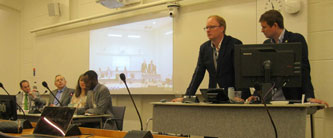 .
. 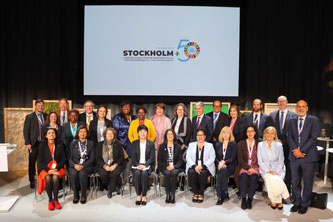 .
. 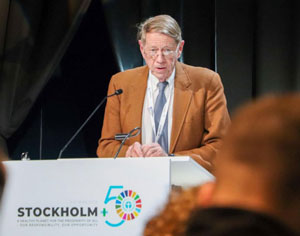
BIC event in Parliament; EMG event (I am in last row second from left); me speaking at EMG event
The IEF organized a virtual event Global Systems Accounting Beyond Economics where I was a panelist. Our Global Governance Forum collaborated with the Global Challenges Foundation in an all day consultation where I moderated a session on reform of the multilateral system. I was again a panelist with several youth on Intergenerational Perspectives on Visions for the Future.
At the Academic Council of the UN System annual meeting in Geneva in June, I was asked to speak in a session on Human Rights and Global Governance, and was co-author on a paper with Sylvia Karlsson-Vinkhuyzen. I went to Lisbon on 27 June-1 July to participate in the UN Ocean Conference 2022. In July, Oxford Rhodes Scholars Marco de Jong and KDee Aimite researched in my archives on the emergence of Small Island Developing States and my preparation of the Oceans, Coastal Areas and Small Islands chapter of Agenda 21 for the 1992 Rio Earth Summit. Marco photographed 6,000 pages of documents to add to the 14,000 pages of my Pacific archives already copied in Samoa, 1/3 of his total research. In October I participated in the first meeting of the WHO People-Planet-Health Action Board to represent unheard voices advising policies at WHO.
I went to India in November for ten days with Augusto Lopez-Claros and Joshua Lincoln for the Global Governance Forum (see separate report), with 15 presentations in Lucknow to 2,800 high school students, several universities and a conference of chief justices of the world, and 7 talks in New Delhi, mostly at universities, as well as an interview by famous Indian TV journalist, Vikram Bahl, for his programme Global View. My interview, titled by the journalist “Are humans also an endangered species?”, was broadcast nationally and can be viewed on YouTube.
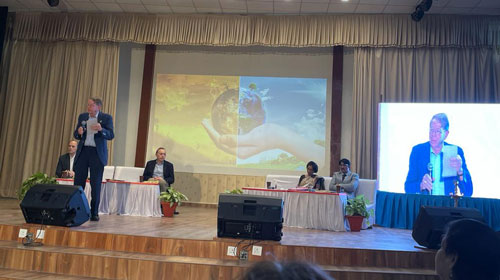 .
. 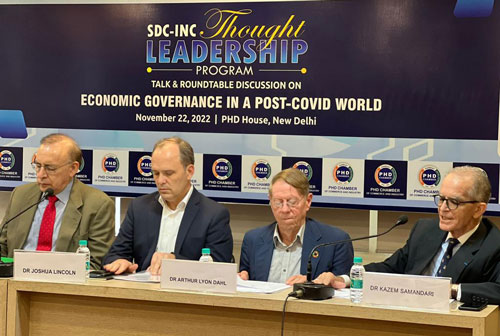
Speaking at Indian Institute of Management; panel at PHD Chamber of Commerce and Industry: Augusto Lopez-Claros, Joshua Lincoln, Arthur Dahl, Kazem Samandari
I started a new project with a high-level group preparing text for UN Charter Revision, with a meeting in Madrid in January. I received the doctoral thesis of Oxford Rhodes Scholar Marco De Jong on the development of Pacific environmentalism. One third of the research material (20,000 pages) came from my archives, and it begins with my work in the region in the 1970s, and ends with my drafting the islands section of Agenda 21 in 1992, making me the subject of historical research. It is a beautiful story of the resilience of indigenous island values in the face of political and scientific colonialism. I prepared bogs on "Global Governance Failures: Warnings by the Secretary-General" on the Global Governance Forum website in February, modified as Confluence of Crises: Warnings by the UN Secretary-General", blog on the International Environment Forum website. I also had a letter published in the journal New Scientist, "Why a space sunshade isn't such a bright idea", on 4 February 2023. Since IEF is accredited to the Convention on Biological Diversity, I was able to provide an expert review of a new draft IPBES report on how to make a fundamental transformation in society, which will be very important when it is completed next year. My blog for the Global Governance Forum on the new High Seas Treaty was published in March. My webinar interview Commemorating Earth Day was released on 22 April.
On 24-26 April I participated in the legacy conference of the Transforming Education for Sustainable Futures research project at the University of Bristol (UK) for which I have been an advisor, speaking on a panel. They have led very successful co-research with local communities as full partners in India, Rwanda, Somalia and South Africa. The UN High Level Advisory Board on Effective Multilateralism released its report, "A breakthrough for People and Planet" on 25 April, and it cited the paper on a Global Environment Agency that Sylvia Karlsson-Vinkhuyzen and I had prepared for the Climate Governance Commission as the source for its recommendations on environmental governance, linking to the IEF website. This was also discussed at the Frontiers Forum on 27-28 April. Another of my blogs on The climate crisis and mental health was posted on the IEF website. My blog Why has environmental governance failed? GREED was posted in May, with another on Microbial extinction is happening posted soon after. The Global Governance Forum released an article Thinking about the Summit of the Future which I co-wrote with Amanda Ellis on two themes in the HLAB report, global environmental governance and gender equality. Building on our work on accounting, I prepared a new page on the IEF website on Accountability as an approach to the failures of implementation and political will in so many international environmental agreements. On 30 May I moderated a webinar for the G20 Interfaith Forum working group on religion and environment which I chair, on Spirited Seas: Science and Spirituality, an Interfaith Exploration of the Environmental Consequences of Deep Seabed Mining. I contributed to UNEP's Horizon Scanning exercise looking at future probabilities, and began a two-month supervision of an intern at the Quaker United Nations Office looking at alternative economic paradigms and measures beyond GDP for environmental justice and sustainability. I went to Madrid in June for another meeting of the expert group preparing revisions to the UN Charter. Later in June I went to Villars-sur-Ollon in the Swiss Alps to participate in the meeting of the Climate Governance Commission, for which I am on the Steering Committee, as well as the Villars Symposium with 120 teenagers for intergenerational dialogue on global governance and sustainability.
My blog on The Debt Bubble was published by the International Environment Forum (IEF) in July. Another for the Global Governance Forum on "Climate Change and World Economy: When an Irresistible Force Meets an Immovable Object" was published in July and republished by the IEF. I lectured on the state of global ecosystems for the CSEND Summer School in Geneva in August. In September the International Environment Forum held its virtual Annual Conference in association with the UN General Assembly Summits on the Sustainable Development Goals, Climate Ambition, and preparations for the 2024 Summit of the Future (SOTF), where I spoke on "Global Environmental Governance" and "Global Solidarity Accounting". See the report on the IEF website. I moderated a G20 Interfaith Forum/KAICIID webinar on "Climate change and the importance of indigenous knowledge".
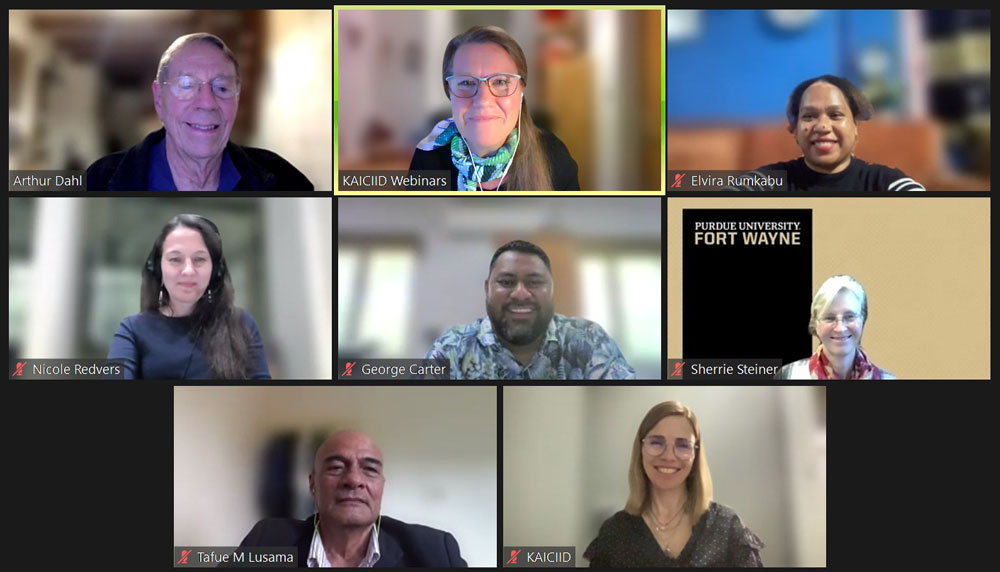
Webinar on Climate change and the importance of indigenous knowledge with indigenous participants
In October I spoke at the European Center for Peace and Development (ECPD) Conference in Belgrade on "The future is to be invented", and then chaired the ECPD Youth Forum the next day on "Youth Leadership for System Change", for both of which I prepared the concept notes and served as rapporteur. In November, I travelled to Lucknow, India, with my Global Governance Forum colleagues, to the City Montessori School, the largest in the world with 61,000 students on 21 campuses, where I spoke on "Climate change, environmental justice and the need to establish an International Environmental Court" to over 2,000 students in five groups, as well as to the Indian Institute of Management, Lucknow University and Amity University MBA students on global governance. This was followed by the 24th International Conference of Chief Justices of the World (see report on IEF website), with 450 high-level participants, where I spoke in the plenary on Environmental Justice.
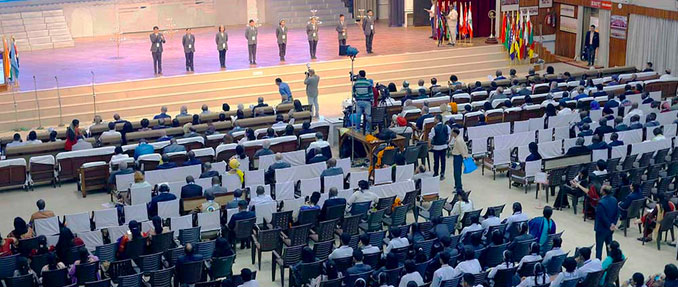
Students presenting to the conference
Later in November I went to Paris to participate in a colloquium on Global Ocean Governance at a joint meeting of the Academies of Overseas Science of France and Belgium, where I gave the closing keynote (see report on IEF website). In preparation for climate change COP28, the Climate Governance Commission report was launched on 28 November (for which I am on the steering committee), and a new coalition Mobilizing an Earth Governance Alliance where I represent IEF and GGF will be launched in January. I followed the UN Climate Change Conference COP28 in Dubai at a distance to prepare a COP28 report for the International Environment Forum. The conference had some success, but far from what was needed to prevent a climate catastrophe. I also drafted an IEF submission on global environmental governance as civil society input to the Summit of the Future next September. My blog with Augusto Lopez-Claros We Must Face the Risks to Our Future Now, originally prepared for the Global Governance Forum, was republished by BahaiTeachings.org in December. My long paper Governance from a Bahá'í Perspective, originally commissioned as a book chapter with a personal perspective, was published by "Politics of Being" on LinkedIn on 14 November, and by IEF.
On 6 January I contributed to an IEF webinar of reflections on COP28, the climate change conference in December, where one IEF member was advisor to the President, another made important contributions to the first successful decision on loss and damage, and there were many Bahá'í International Community and Climate Governance Commission contributions. On governance, my proposal to add a fourth piller on managing the Earth System to a draft Second UN Charter was accepted at a high level drafting group meeting in Madrid on 26-28 January.
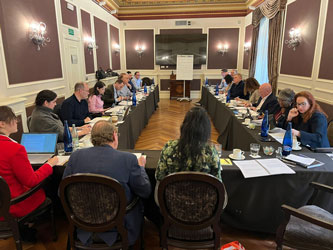 .
.  .
. 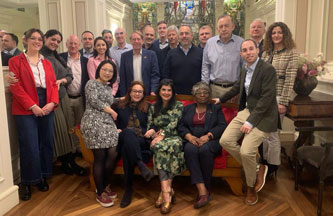
UN Second Charter drafting meeting in Madrid
I also started analysing the zero draft of the Pact for the Future to be considered at the UN Summit of the Future next September, and reviewed an amazing draft IPBES report on transformative change.
In February I worked on global environmental governance and a written submission to the Summit of the Future (SoTF) process. My "Call for a UN Earth System Council" was posted on the International Environment Forum website. The European Center for Peace and Development, University for Peace, asked me to prepare a concept note on youth perspectives on the SoTF for their planned International Youth Forum in Beijing, which I was to chair, but this was later postponed to 2025.
March was a productive month. My chapter "Towards Effective Multilevel Environmental and Sustainability Governance for Shared Ecological Risks", was published in Global Governance and International Cooperation: Managing Global Catastrophic Risks in the 21st Century, edited by Richard Falk and Augusto Lopez-Claros, chapter 19, pp. 317-331, London: Routledge. I continued my contributions to the G20 Interfaith Forum as chair of the environment working group, meeting with its leaders in Geneva, preparing contributions on climate change for its next meeting in Brazilia in August, and drafting a policy brief on climate change. On 12 March I participated in the European Center for Peace and Development (ECPD) Council meeting in Madrid and prepared its report. On 26 March I contributed to the Mobilizing an Earth Governance Alliance (MEGA) launch in Geneve alongside the Inter-Parliamentary Union conference. Another project has been drafting a background brief and chapter on science, innovation and digital technology for the People's Pact on the Future.
The first part of April in the Netherlands I gave the opening keynote and workshops at The Justice Conference on A Systems View of Justice, followed by a week of other meetings including on Bahá'í perspectives on agriculture at Wageningen University.

The Justice Conference, de Poort, The Netherland, April 2024
May started with book review of ‘Adasíyyih: The Story of ‘Abdu’l-Bahá’s Model Farming Community, by my old friend Paul Hanley. At the ebbf Annual Conference in Lisbon on 16-19 May, I gave a keynote and workshop on The Cooperation Economy, showing how systems science demonstrates that cooperation is much better than competition in building effective and productive systems.
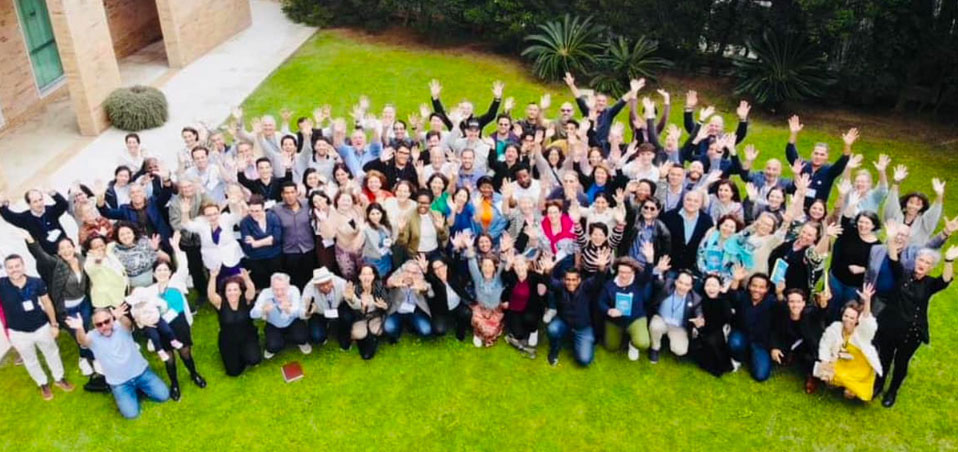
ebbf Annual Conference in Lisbon
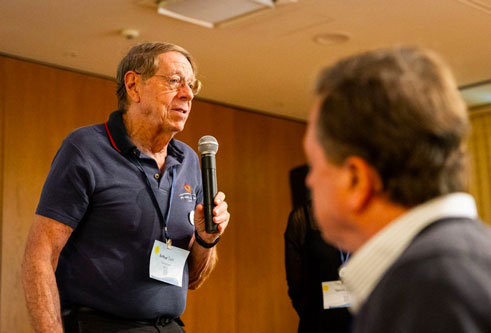 .
. 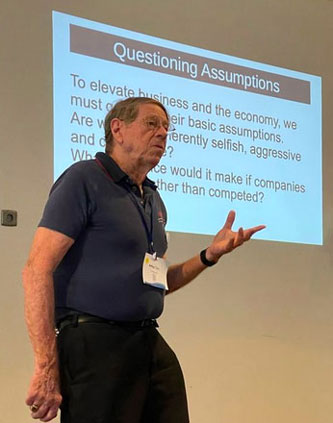
Speaking at the conference
I took part in a meeting coordinating different groups working on global catastrophic risks, such as the Global Catastrophic Risk Index I helped to prepare for the Global Governance Forum, to be updated later in the year. On 27 May I moderated an InterFaith20/KAICIID webinar on "Climate change and the importance of Indigenous knowledge" with several indigenous participants, for which I had already prepared a blog on Climate Change and Small Island Developing States (also at IEF). On 31 May I took part in an expert roundtable on implementing some recommendations of the Climate Governance Commission including declaring a planetary emergency and enhancing Earth System scientific capacity, where I have played a lead.
On 22 June, Sylvia Karlsson-Vinkhuyzen and I spoke virtually at an Academic Council of the UN System (ACUNS) conference in Tokyo on our work for the Climate Governance Commission and the Global Governance Innovation Network on "Options for Strengthening Accountability Mechanisms in Global Environmental Governance," with a written policy brief submitted at the end of the month.
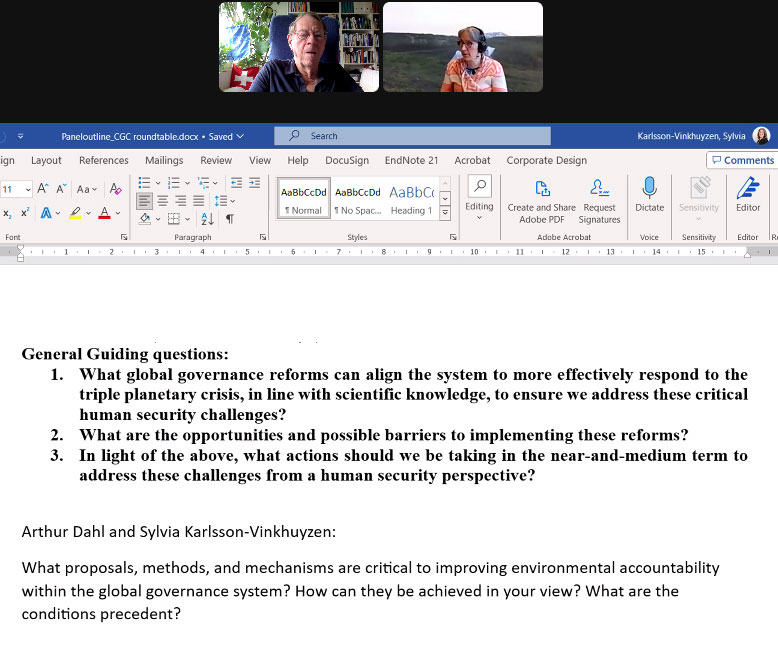
For the first meeting 27 June of the Trans-National Working Group on Values, Faith-Based Perspectives and Global Governance, organised by the World Federalist Movement, which includes IEF, I prepared a blog on the IEF website on a Fossil carbon value added tax.
I went to Berlin 7-11 July for the work on a Second UN Charter to be launched in September. From Berlin on 8 July I spoke to the Quaker UN Summer School in Geneva on "Reframing economic systems and paradigms". In preparation for the G20 Interfaith Forum next month, I drafted a policy brief on Faith Action in Response to Climate Change.
On 18-24 August I went to Brasilia, Brazil, for the G20 Interfaith Forum on Religion and Sustainable Development. I chair the IF20 working group on environment, and spoke on the history of religious advocacy on environment.
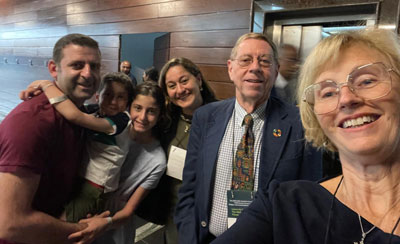 .
. 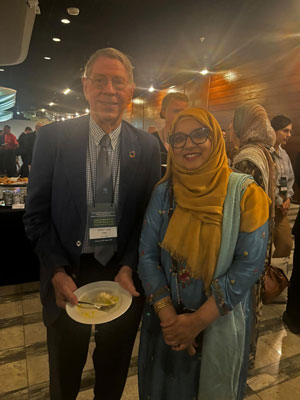
me with Sherrie Steiner of IF20 and Monica Maghami from IEF and family; me with Husna Ahmad
In September, the International Environment Forum 28th Annual Conference was a series of virtual events associated with the UN Summit of the Future, on the theme "A World-embracing Vision for a Sustainable Future". It started on 14 September with A vision for a Sustainable Future - a Conversation with Youth, continuing on 17 September with Developing a vision for global collaboration, and on 22 September with Building Futures in Communities, and concluding on 28 September with Where Do We Go from Here? - Deeds not Words where I spoke on the Pact for the Future and challenges in implementation, and prepared a report. The Global Governance Forum launched the Second UN Charter that I helped to draft, in New York on 19 September.
On 19-20 October in Geneva I participated in the UNECE CSW civil society regional consultation on preparation for the Beijing+30 Women's Conference, as one of the few males present.
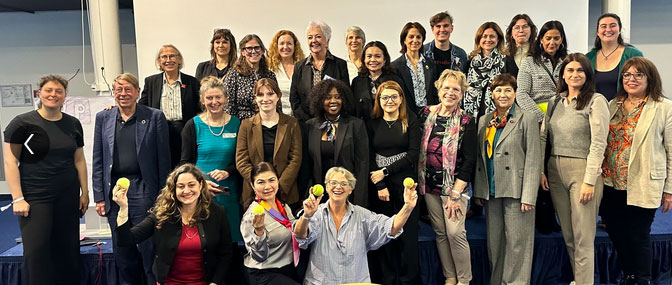
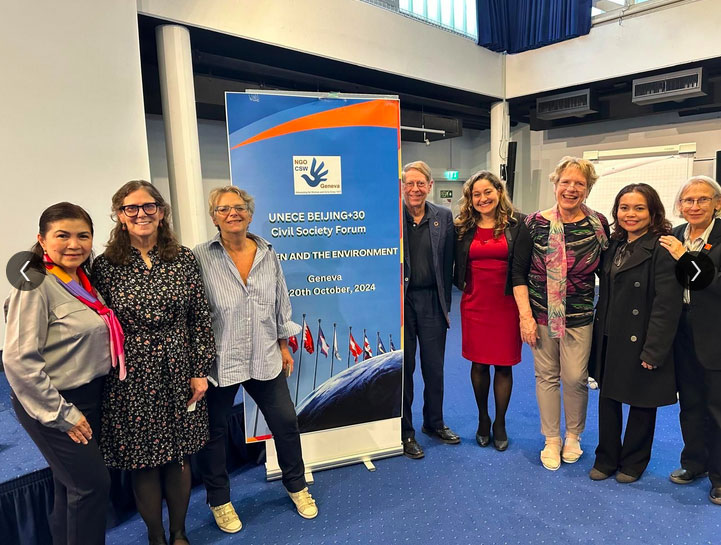
UNECE Beijing+30 civil society consultation
On 28 November, the Geneva Environment Network organized a round table discussion of the "elders" to commemorate its 25th anniversary, and I was one of the panelists, meeting some colleagues I had not seen for years. See From Stockholm to Rio to Geneva: six decades of enhancing collaboration and https://iefworld.org/node/1649.

Geneva Environment Network with Frits Schlingemann, Larry Kohler, Arthur Dahl
While the Climate Change COP29 did not produce a very satisfactory outcome, I helped to prepare an interfaith call for action submitted to the COP, and was a signatory on a letter to the COP from many experts with whom I collaborate calling for a new focus and procedures towards implementation, that was reported in all the media. Finally, on 30 November, I took the train to Mantova, Italy, where the Keyvan Foundation asked me to speak on "New Governance for a Sustainable Future".
The Intergovernmental Science-Policy Platform on Biodiversity and Ecosystem Services (IPBES) issued an excellent report, the Transformative Change Assessment https://iefworld.org/IPBEStransformative which maps out what we need to do and how to do it to fundamentally change the direction of society towards sustainability, for which I had previously provided an external review. The Transformative Change Assessment is so significant in recommending many of the actions in the Bahá'í approach to transformation that I immediately announced it on the IEF website and then prepared a compilation of Bahá'í quotations corresponding to each key point in the assessment. I also followed the oral arguments before the International Court of Justice in preparing its advisory opinion on climate change https://iefworld.org/ICJadvisory2024. On 16 December I contributed to another Geneve Environment Network event on collaboration with faith-based organisations. My big project now is to write some memoirs on the lessons I have learned in trying to be coherent between my professional work as an environmental scientist and my spiritual values as a Bahá'í.
In January I prepared blogs on Transformative Change: A Bahá'í Perspective on the IPBES Assessment on G20 Interfaith Forum website, and on Reflections on Information on IEF website, and contributed to a virtual meeting of the Triglav Circle on why the sciences are pushing out the humanities, sharing the Bahá'í perspective on the need for ethics and values to rise above materialism. On 19 January I spoke in Thonon-les-Bains on an interfaith panel for World Religion Day.
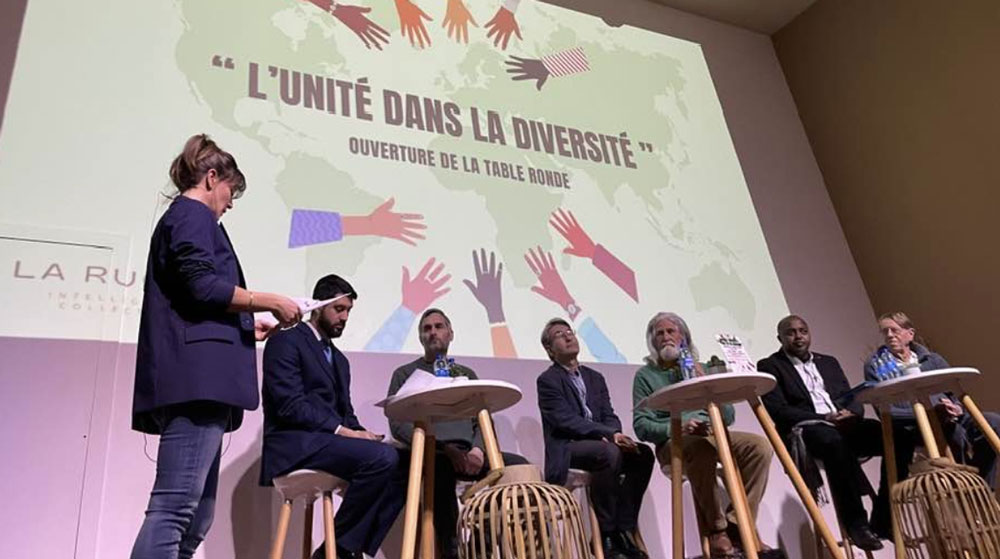
World Religion Day panel, Thonon-les-Bains
The Geneva Environment Network invited me to its commemoration of 25 years on 20 January. Then in February I traveled to Hamburg, Germany, for an Expert Meeting on Proposals to Enhance Global Environmental Governance at The New Institute, for the Climate Governance Commission (CGC), building on the paper Sylvia Karlsson-Vinkhuyzen and I prepared for the CGC a few years ago. The meeting reviewed Earth System governance, the design of UNEP, principle-based decision-making, the Global Commons Alliance and the Earth Commission, institutional upgrades to adopt binding global legislation, a Global Resilience Council, Earth System management as a fourth pillar of the UN, necessary governance functions, a Planetary Emergency Declaration and platform, governance gaps, and adaptive governance. It also explored proposals for an International Court for the Environment.
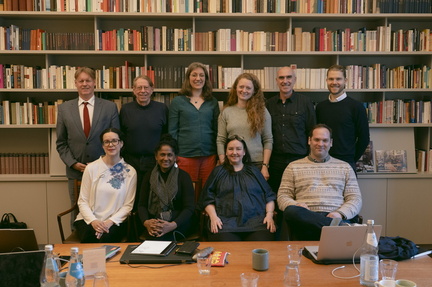 .
. 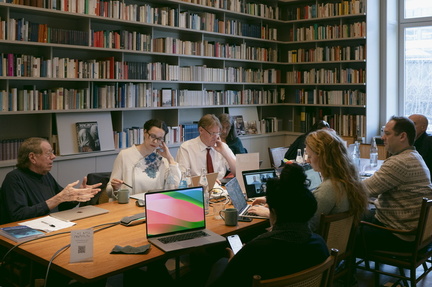
Expert Meeting on Global Environmental Governance
For the IEF website, I prepared a blog on Global Disintegration and Integration, a summary of Post-growth: the science of wellbeing within planetary boundaries by Giorgos Kalis et al., as well as a book review of The Forever Crisis: Adaptive Global Governance. My online youth classes covered issues of discourse of interest to young people, with 48 now available on my website.
In March I prepared a blog for the Global Governance Forum on the latest warnings on climate change. I also followed the UN Ocean Forum at the Palais des Nations to learn the latest about this threatened resource. My next blog was about What are rights worth?. I visited the Netherlands from 11-21 April for a class on the Earth System for the junior youth, a fireside on transformative change, a dinner with researchers from Wageningen University, and a deepening on growing spiritually, before going to the Justice Conference at de Poort 18-21 April, where I gave a keynote and held two workshops on "Building Community Resilience Against Complex Risks" described here.
On 1 May I contributed online to a UN University discussion of climate governance. I flew to Istanbul on 8-11 May for the ebbf-Ethical Business Building the Future annual conference on the theme "Leading with Purpose: Building Capacity for Progress at the Crossroads".
 .
. 
ebbf Annual Conference in Istanbul
Then I restructured the content on the International Environment Forum website, which had accumulated more that 1500 pages in more than 20 years, preparing pages on climate change, biodiversity, sustainability, governance, values, discourse and social action, explaining the themes and listing all the content chronologically: https://iefworld.org. I also prepared for IEF a paper summarising our experience in developing Values-based Transformative Learning. Discovering a Bahá'í quotation on reducing working hours inspired a blog on A better future for Artificial Intelligence. I then wrote three more blogs: on Microplastics, on Health benefits of nature, and a book review of Cultural Ecosystem Services. An issue brief that Sylvia Karlsson-Vinkhuyzen and I wrote for the Global Governance Innovation Network and the Climate Governance Commission on Options for Strengthening Accountability Mechanisms in Global Environmental Governance was published at the end of May.
June started with a Climate Governance Commission meeting and the World Environment Day commemoration on 5 June at International Environment House in Geneva where I used to work. On 7-9 June I went to the Les Fontaines conference centre north of Paris for an intensive ASRA conference with 250 invited participants on "Currents of Change: New Horizons in Systemic Risk". We discussed catastrophic systems failure, and what it would take to address systemic risk, among many other topics. A participant, Lewis Akenji, who had taken a class with me many years ago, told me that hearing my lecture on coral reef ecosystems based on cooperation and reciprocity, and then reading my book "The Eco Principle", led him to abandon his career in accounting to study sustainability for his doctorate. He now has his own organisation Hot or Cool Institute, is a member of the Club of Rome, and a leading thinker on the transformation towards sustainability with justice. On 14 June, the Stevenson School in California where I studied 1954-1960 gave me the annual alumni award for contributions to society. On 24 June I spoke virtually at a Academic Council of the UN System (ACUNS) event on comprehensive multilateral strategies to address the refugee and climate change challenges. Then I was off to England 26-30 June for the International Environment Forum (IEF) annual conference near Oxford on Building Capacity for Sustainability Discourse and Action, where I introduced IEF to the participants and gave a keynote on the environmental challenges facing communities around the world. The presentation can be viewed here.
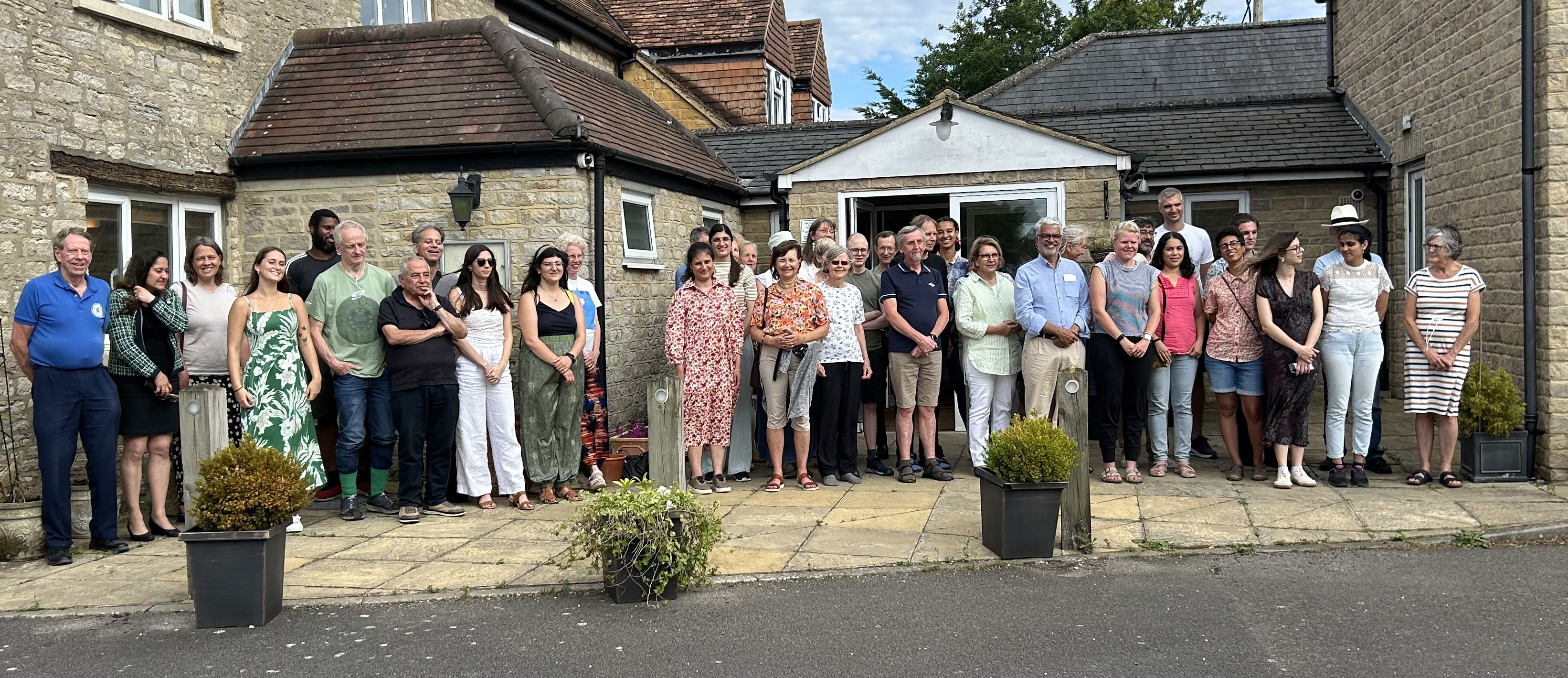
IEf Annual Conference near Oxford, UK
In July my blog on a UN Global Seaweed Initiative recalled my early career interest. On 7-8 July I contributed to a Global Governance Forum review of protocols to its proposed Second UN Charter. Katoikos.world interviewed and recorded me for a 42 minute podcast "The Global Citizen" for FOGGS issued on 17 July on Reimagining our relationship with the Earth, The Eco Principle, based on my book from 30 years ago but still totally relevant. At the end of the month, I prepared a blog for the Global Governance Forum on Governing the Planet: Why We Need an Earth System Council Now. The Swiss Bahá'í Community posted La Foi bahá'íe, une religion écologique (in French) on religion.ch on 29 July.
In August, my old friend Virginie Tilot included me as a co-author in her latest book chapter on The Role of Rapid Environmental Assessment in Monitoring the Environmental Impacts of Deep-Sea Mining. I prepared two book reviews, of Goliath’s Curse: The History and Future of Societal Collapse, and of The Way of Unity: Essential Principles and Preconditions for Peace. Sylvia Karlsson-Vinkhuyzen and I published a paper Turning Words into Action: Designing Accountability Mechanisms with Impact for Multilateral Environmental Agreements in the journal Global Governance: A Review of Multilateralism and International Organizations on 26 August.
I taught in the International Environment Forum (IEF) online course on Scientific and Spiritual Dimensions of Climate Change from September to November with a hundred enrolled. The Brazilian presidency of the climate change COP30 in November called for contributions to a Global Ethical Stocktake, so IEF invited some of its members to contribute, and I prepared a compilation of Bahá'í texts responding to the questions raised. We received inputs from Malaysia, New Zealand, North America, Australia and India. I also got the G20 Interfaith Forum to prepare a GES contribution during its forum in South Africa. My old friend Austin Bowden-Kerby in Fiji reported on the tragedy of Dead corals in Tuvalu which I summarised on the IEF website. The Swiss Bahá'í magazine published my article in French on one of the first Bahá'ís in the West, Agnes Baldwin Alexander. Les premiers croyants en Occident, whom I knew personally.
I went in October to the ebbf-ethical business building the future Impact Retreat in Acuto, Italy to explore being more coherent between our values and our actions.
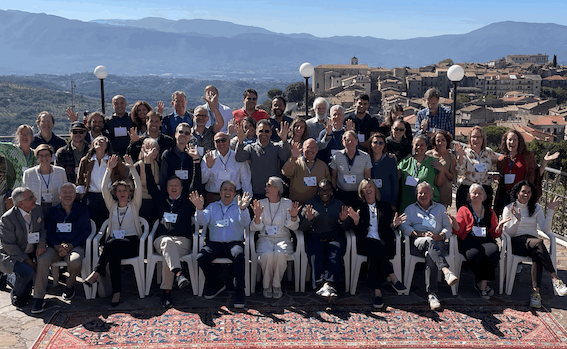
ebbf Impact Retreat at Acuto, Italy
I then reviewed a new report by my old friend Lewis Akenji on A Climate for Sufficiency: 1.5-Degree Lifestyles. For the Bahá'í Institute of Higher Education, in Iran, I lectured to their masters in environmental science on the history of Bahá'í engagement with environmental issues. I participated in a conference at the Palais des Nations organised by Widows for Peace, for which I prepared a presentation on Women and Climate Change Resilience, before speaking to a Global Ethical Stocktake discussion in India, and lecturing to an American Academy of Religion webinar on 31 October.
In November I facilitated Zoom discussions for the IEF online course on climate change as the course ended, chaired the IF20 Religion and Environment working group, and took part in a Geneva March for the Climate. After following many reports online about the climate change COP30 in Belém, Brazil, where two IEF members were participating, I prepared a summary and commentary Confrontation in Belém for the IEF website, before presiding over the IEF General Assembly in two virtual sessions for different time zones.